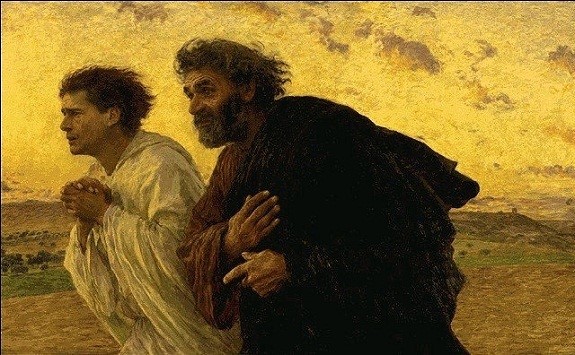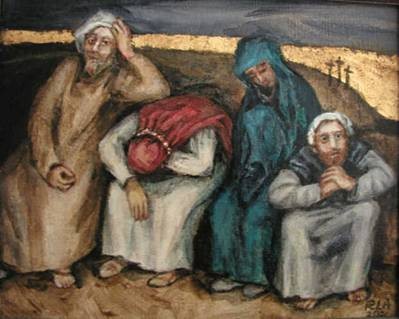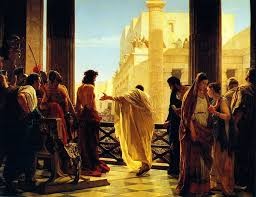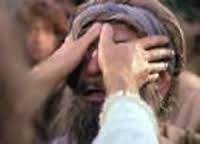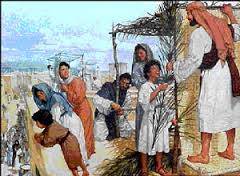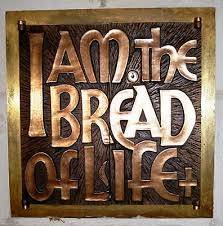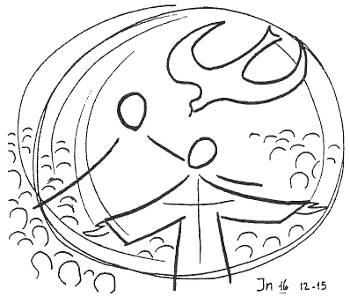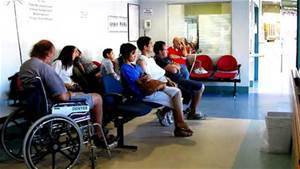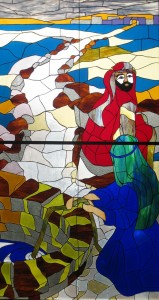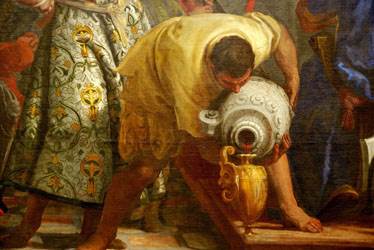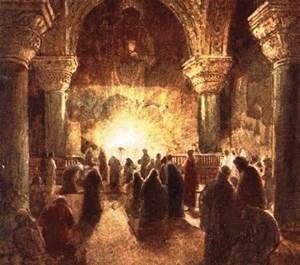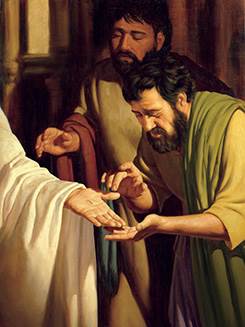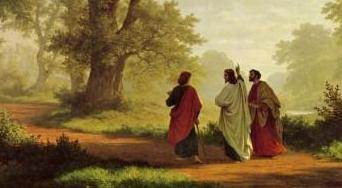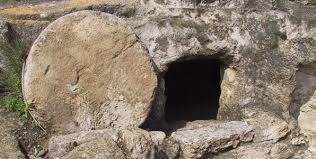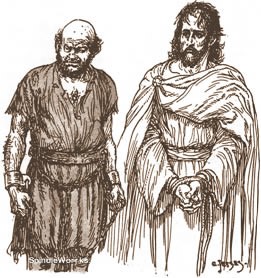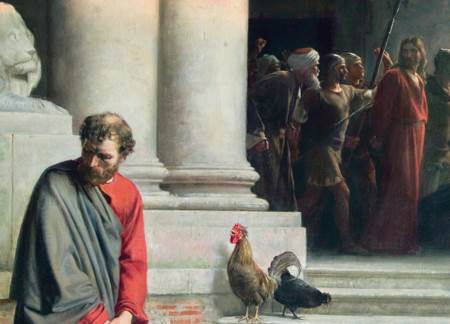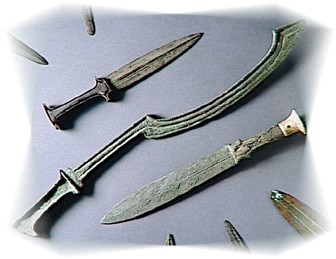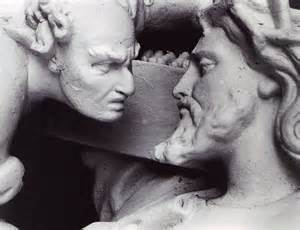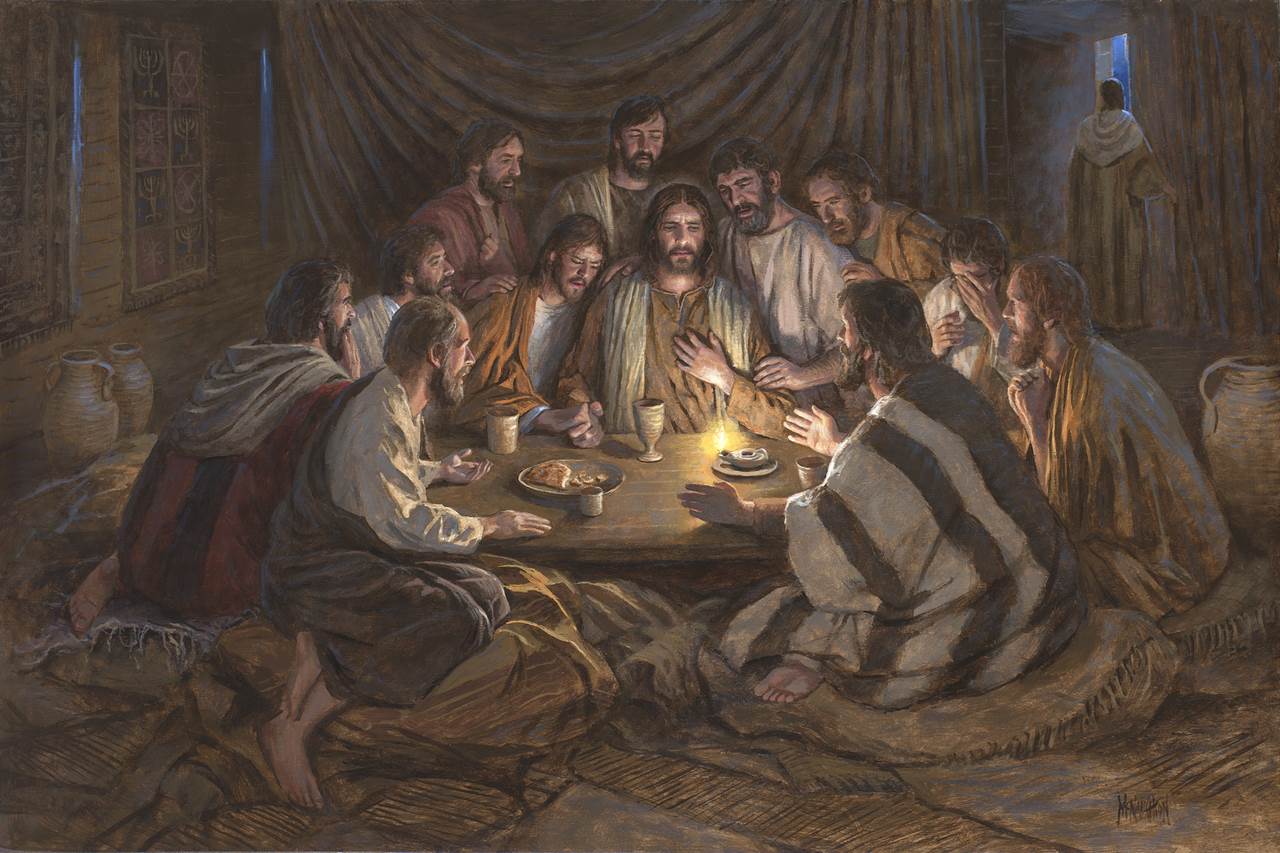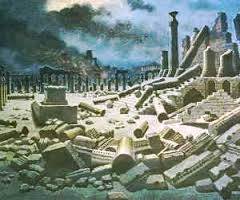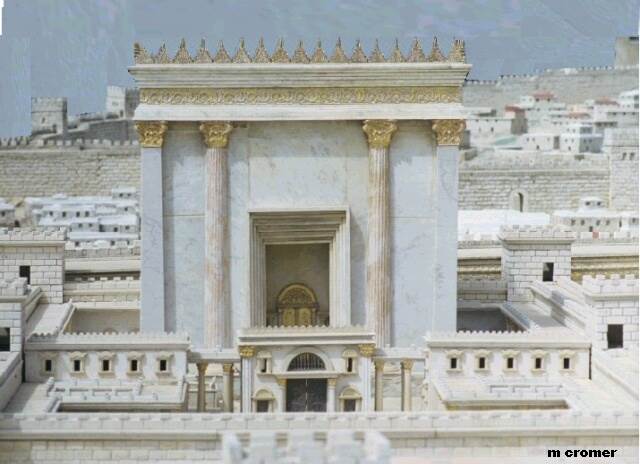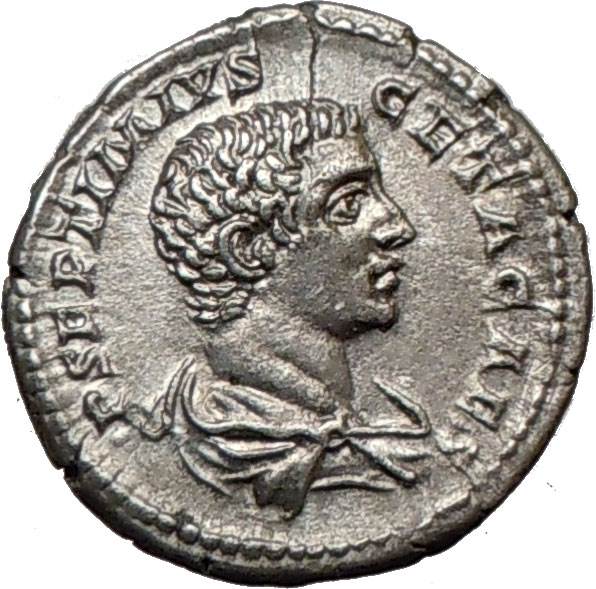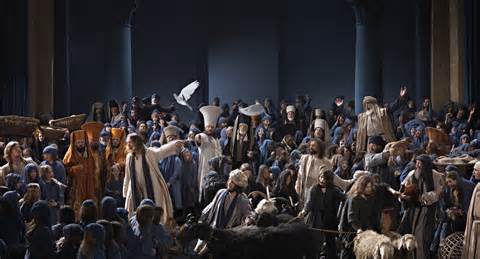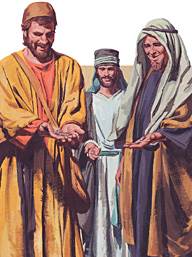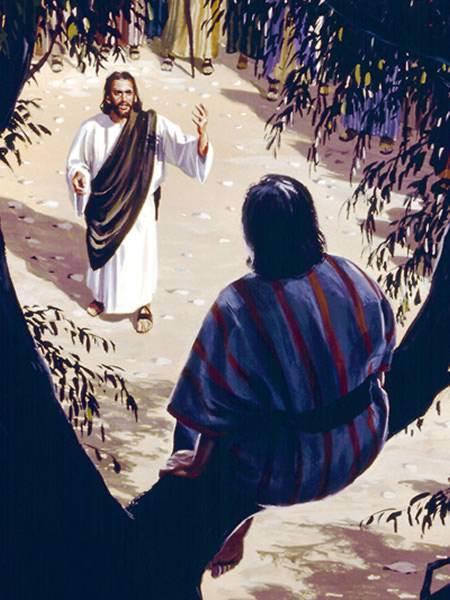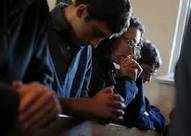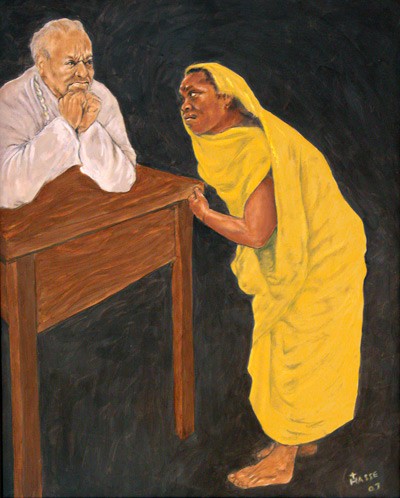Pastor Sarah offers continuous readings of the Bible. We are currently reading the Gospel of John.
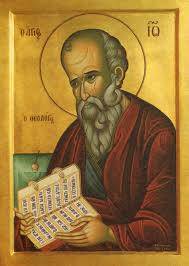 Dear Friends, Easter 2015 John #32
Dear Friends, Easter 2015 John #32
Each time I read the conclusion of John’s gospel I have the same reaction: I wish he had written more! The author says there were many other things that testify to Jesus as the Son of God that could have been recorded. So I’m disappointed that John didn’t keep writing!
This is our final reading in the gospel of John. Now I would love to hear from you. Take a minute and let me know what the experience of reading John during Lent was like for you. Give me any feedback you want to share.
Since we began our reading together in April 2011 we’ve read all four gospels as well as Acts, Romans, Hebrews, 1 Corinthians, 1 Thessalonians and Galatians; and in the Old Testament we’ve read Genesis and Exodus. I’m going to take a short break and then we’ll start in again with a new book. Any suggestions for what to read next???
Blessings on your reading,
Pastor Sarah
John 21:24-25
This disciple is the one who testifies to these events and has recorded them here. And we know that his account of these things is accurate.
Jesus also did many other things. If they were all written down, I suppose the whole world could not contain the books that would be written.
>>>>><<<<<
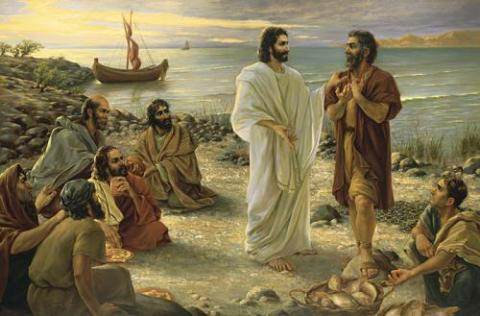 Dear Friends, Easter 2015 John #31
Dear Friends, Easter 2015 John #31
Scholars believe the gospel of John originally ended at 20:31, with chapter 21 added later, perhaps by the same author or by another member of his community.
John 21 serves as a commissioning of the disciples by Jesus. It is similar to the fishing scene in Luke 5 where the disciples also benefit from Jesus’ suggestion and get a huge catch of fish. In both cases the disciples are successful in their careers as fishermen, but are called by Jesus to do something else.
There has been a lot of discussion over the exact number of fish caught in John 21 without any compelling explanation about the meaning of the number. Perhaps they were just counting the number of fish they caught, 153, and it is what it is.
Enjoy the total reconciliation between Jesus and Peter as the question about love is asked and answered three times.
Blessings on your reading,
Pastor Sarah
John 20:30-31
The disciples saw Jesus do many other miraculous signs in addition to the ones recorded in this book. But these are written so that you may continue to believe that Jesus is the Messiah, the Son of God, and that by believing in him you will have life by the power of his name.
John 21:1-23
Later, Jesus appeared again to the disciples beside the Sea of Galilee. This is how it happened. Several of the disciples were there—Simon Peter, Thomas (nicknamed the Twin), Nathanael from Cana in Galilee, the sons of Zebedee, and two other disciples.
Simon Peter said, “I’m going fishing.”
“We’ll come, too,” they all said. So they went out in the boat, but they caught nothing all night.
At dawn Jesus was standing on the beach, but the disciples couldn’t see who he was. He called out, “Fellows, have you caught any fish?”
“No,” they replied.
Then he said, “Throw out your net on the right-hand side of the boat, and you’ll get some!” So they did, and they couldn’t haul in the net because there were so many fish in it.
Then the disciple Jesus loved said to Peter, “It’s the Lord!” When Simon Peter heard that it was the Lord, he put on his tunic (for he had stripped for work), jumped into the water, and headed to shore. The others stayed with the boat and pulled the loaded net to the shore, for they were only about a hundred yards from shore. When they got there, they found breakfast waiting for them—fish cooking over a charcoal fire, and some bread.
“Bring some of the fish you’ve just caught,” Jesus said. So Simon Peter went aboard and dragged the net to the shore. There were 153 large fish, and yet the net hadn’t torn.
“Now come and have some breakfast!” Jesus said. None of the disciples dared to ask him, “Who are you?” They knew it was the Lord. Then Jesus served them the bread and the fish. This was the third time Jesus had appeared to his disciples since he had been raised from the dead.
After breakfast Jesus asked Simon Peter, “Simon son of John, do you love me more than these?”
“Yes, Lord,” Peter replied, “you know I love you.”
“Then feed my lambs,” Jesus told him.
Jesus repeated the question: “Simon son of John, do you love me?”
“Yes, Lord,” Peter said, “you know I love you.”
“Then take care of my sheep,” Jesus said.
A third time he asked him, “Simon son of John, do you love me?”
Peter was hurt that Jesus asked the question a third time. He said, “Lord, you know everything. You know that I love you.”
Jesus said, “Then feed my sheep.
“I tell you the truth, when you were young, you were able to do as you liked; you dressed yourself and went wherever you wanted to go. But when you are old, you will stretch out your hands, and others will dress you and take you where you don’t want to go.” Jesus said this to let him know by what kind of death he would glorify God. Then Jesus told him, “Follow me.”
Peter turned around and saw behind them the disciple Jesus loved—the one who had leaned over to Jesus during supper and asked, “Lord, who will betray you?” Peter asked Jesus, “What about him, Lord?”
Jesus replied, “If I want him to remain alive until I return, what is that to you? As for you, follow me.” So the rumor spread among the community of believers that this disciple wouldn’t die. But that isn’t what Jesus said at all. He only said, “If I want him to remain alive until I return, what is that to you?”
>>>>><<<<<
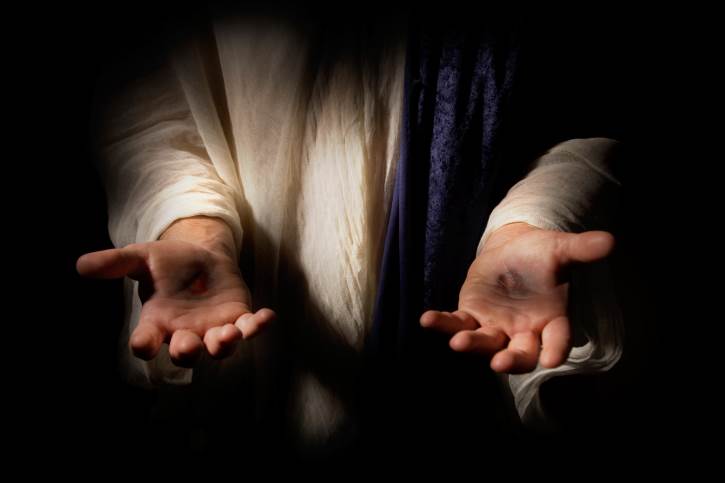 Dear Friends, Lent/Easter 2015 John #30
Dear Friends, Lent/Easter 2015 John #30
Remember in chapter 14 Jesus told his disciples that one of the reasons he had to leave them was so they could receive the Advocate, the Holy Spirit. The author of Luke and Acts presents the disciples receiving the Holy Spirit at the Pentecost celebration 50 days after Easter. But in John the disciples receive the Spirit on Easter.
Today’s reading also tells the well-known story of Thomas, the disciple who could not believe in the resurrection without proof. Jesus gives Thomas what he needs to have faith. And then he adds, “Blessed are those who believe without seeing me.” A slightly different translation is offered by Father Richard Rohr in his book Immortal Diamond: “Blessed are those who know more than they can see.”
Blessings on your reading,
Pastor Sarah
John 20:19-29
That Sunday evening the disciples were meeting behind locked doors because they were afraid of the Jewish leaders. Suddenly, Jesus was standing there among them! “Peace be with you,” he said. As he spoke, he showed them the wounds in his hands and his side. They were filled with joy when they saw the Lord! Again he said, “Peace be with you. As the Father has sent me, so I am sending you.” Then he breathed on them and said, “Receive the Holy Spirit. If you forgive anyone’s sins, they are forgiven. If you do not forgive them, they are not forgiven.”
One of the twelve disciples, Thomas (nicknamed the Twin), was not with the others when Jesus came. They told him, “We have seen the Lord!”
But he replied, “I won’t believe it unless I see the nail wounds in his hands, put my fingers into them, and place my hand into the wound in his side.”
Eight days later the disciples were together again, and this time Thomas was with them. The doors were locked; but suddenly, as before, Jesus was standing among them. “Peace be with you,” he said. Then he said to Thomas, “Put your finger here, and look at my hands. Put your hand into the wound in my side. Don’t be faithless any longer. Believe!”
“My Lord and my God!” Thomas exclaimed.
Then Jesus told him, “You believe because you have seen me. Blessed are those who believe without seeing me.”
>>>>><<<<<
Dear Friends, Lent / Easter 2015 John #29
YES!
Blessings on your Easter celebration!
Pastor Sarah
John 20-1-18
Early on Sunday morning, while it was still dark, Mary Magdalene came to the tomb and found that the stone had been rolled away from the entrance. She ran and found Simon Peter and the other disciple, the one whom Jesus loved. She said, “They have taken the Lord’s body out of the tomb, and we don’t know where they have put him!”
Peter and the other disciple started out for the tomb. They were both running, but the other disciple outran Peter and reached the tomb first. He stooped and looked in and saw the linen wrappings lying there, but he didn’t go in. Then Simon Peter arrived and went inside. He also noticed the linen wrappings lying there, while the cloth that had covered Jesus’ head was folded up and lying apart from the other wrappings. Then the disciple who had reached the tomb first also went in, and he saw and believed— for until then they still hadn’t understood the Scriptures that said Jesus must rise from the dead. Then they went home.
Mary was standing outside the tomb crying, and as she wept, she stooped and looked in. She saw two white-robed angels, one sitting at the head and the other at the foot of the place where the body of Jesus had been lying. “Dear woman, why are you crying?” the angels asked her.
“Because they have taken away my Lord,” she replied, “and I don’t know where they have put him.”
She turned to leave and saw someone standing there. It was Jesus, but she didn’t recognize him. “Dear woman, why are you crying?” Jesus asked her. “Who are you looking for?”
She thought he was the gardener. “Sir,” she said, “if you have taken him away, tell me where you have put him, and I will go and get him.”
“Mary!” Jesus said.
She turned to him and cried out, “Rabboni!” (which is Hebrew for “Teacher”).
“Don’t cling to me,” Jesus said, “for I haven’t yet ascended to the Father. But go find my brothers and tell them, ‘I am ascending to my Father and your Father, to my God and your God.’”
Mary Magdalene found the disciples and told them, “I have seen the Lord!” Then she gave them his message.
>>>>><<<<<
Dear Friends, Lent 2015 John #28
The passion narrative begins in the Garden of Gethsemane and now ends in another garden. The gospels are silent about what happened to Jesus on Saturday, even though the Apostle’s Creed says “he descended into hell.”
Many Christians attend Easter vigils this evening, where it is customary to baptize new believers. St. Luke’s does not hold a vigil, but you may be able to find a church near you that does.
In other countries Saturday has some traditions tied to Judas. For example, In Mexico today is known as Judas Day and people may burn effigies of Judas. A Czech custom is to rattle keys and burn out Judas by burning holy oil before the church door.
Today is a day of contemplation. I have posted some suggestions for observing the day on St. Luke’s Facebook page.
Blessings on your reading and your contemplation,
Pastor Sarah
John 19:38-42
Afterward Joseph of Arimathea, who had been a secret disciple of Jesus (because he feared the Jewish leaders), asked Pilate for permission to take down Jesus’ body. When Pilate gave permission, Joseph came and took the body away. With him came Nicodemus, the man who had come to Jesus at night. He brought about seventy-five pounds of perfumed ointment made from myrrh and aloes. Following Jewish burial custom, they wrapped Jesus’ body with the spices in long sheets of linen cloth. The place of crucifixion was near a garden, where there was a new tomb, never used before. And so, because it was the day of preparation for the Jewish Passover and since the tomb was close at hand, they laid Jesus there.
>>>>><<<<<
Dear Friends, Lent 2015/Good Friday John #27
Today, Good Friday, our reading is the trial and crucifixion of Jesus. It isn’t often that Good Friday and the first day of Passover fall on the same date, but it is true this year. According to the gospel of John it was also true on the day that Jesus died. In John, Jesus died on the cross at the same time that Passover lambs were being slaughtered in the temple for that evening’s Seder meal.
Our reading begins with the account of Peter’s denials of Jesus, something which Peter had so confidently assured Jesus would never happen. Indeed the denials are so casual Peter doesn’t seem to realize what he is doing until he hears the rooster crow.
The phrase “plausible deniability” was probably not in use in Pilate’s time, although he tried very hard to master it in the case of Jesus. He did not want to be held responsible for Jesus’ execution, and ordered the crucifixion only when pressed to by the Jewish religious authorities. Pilate is not interested in truth, but he is interested in power. He could not afford to offend the religious leaders and still rule over a peaceful kingdom, something which was very important to keeping his job with Caesar. Ultimately Jesus was executed for his crime against religion, blasphemy; and for his crime against the state, insurrection. Jesus’ proclamation of the coming “Reign of the Kingdom of God” offended both “church and state.”
Blessings on your reading and on your contemplations,
Pastor Sarah
John 18:12 —19:37
So the soldiers, their commanding officer, and the Temple guards arrested Jesus and tied him up. First they took him to Annas, since he was the father-in-law of Caiaphas, the high priest at that time. Caiaphas was the one who had told the other Jewish leaders, “It’s better that one man should die for the people.”
Simon Peter followed Jesus, as did another of the disciples. That other disciple was acquainted with the high priest, so he was allowed to enter the high priest’s courtyard with Jesus. Peter had to stay outside the gate. Then the disciple who knew the high priest spoke to the woman watching at the gate, and she let Peter in. The woman asked Peter, “You’re not one of that man’s disciples, are you?”
“No,” he said, “I am not.”
Because it was cold, the household servants and the guards had made a charcoal fire. They stood around it, warming themselves, and Peter stood with them, warming himself.
Inside, the high priest began asking Jesus about his followers and what he had been teaching them. Jesus replied, “Everyone knows what I teach. I have preached regularly in the synagogues and the Temple, where the people gather. I have not spoken in secret. Why are you asking me this question? Ask those who heard me. They know what I said.”
Then one of the Temple guards standing nearby slapped Jesus across the face. “Is that the way to answer the high priest?” he demanded.
Jesus replied, “If I said anything wrong, you must prove it. But if I’m speaking the truth, why are you beating me?”
Then Annas bound Jesus and sent him to Caiaphas, the high priest.
Meanwhile, as Simon Peter was standing by the fire warming himself, they asked him again, “You’re not one of his disciples, are you?”
He denied it, saying, “No, I am not.”
But one of the household slaves of the high priest, a relative of the man whose ear Peter had cut off, asked, “Didn’t I see you out there in the olive grove with Jesus?” Again Peter denied it. And immediately a rooster crowed.
Jesus’ trial before Caiaphas ended in the early hours of the morning. Then he was taken to the headquarters of the Roman governor. His accusers didn’t go inside because it would defile them, and they wouldn’t be allowed to celebrate the Passover. So Pilate, the governor, went out to them and asked, “What is your charge against this man?”
“We wouldn’t have handed him over to you if he weren’t a criminal!” they retorted.
“Then take him away and judge him by your own law,” Pilate told them.
“Only the Romans are permitted to execute someone,” the Jewish leaders replied. (This fulfilled Jesus’ prediction about the way he would die.) John 12:32-33
Then Pilate went back into his headquarters and called for Jesus to be brought to him. “Are you the king of the Jews?” he asked him.
Jesus replied, “Is this your own question, or did others tell you about me?”
“Am I a Jew?” Pilate retorted. “Your own people and their leading priests brought you to me for trial. Why? What have you done?”
Jesus answered, “My Kingdom is not an earthly kingdom. If it were, my followers would fight to keep me from being handed over to the Jewish leaders. But my Kingdom is not of this world.”
Pilate said, “So you are a king?”
Jesus responded, “You say I am a king. Actually, I was born and came into the world to testify to the truth. All who love the truth recognize that what I say is true.”
“What is truth?” Pilate asked.
Then he went out again to the people and told them, “He is not guilty of any crime. But you have a custom of asking me to release one prisoner each year at Passover. Would you like me to release this ‘King of the Jews’?”
But they shouted back, “No! Not this man. We want Barabbas!” (Barabbas was a revolutionary.)
Then Pilate had Jesus flogged with a lead-tipped whip. The soldiers wove a crown of thorns and put it on his head, and they put a purple robe on him. “Hail! King of the Jews!” they mocked, as they slapped him across the face.
Pilate went outside again and said to the people, “I am going to bring him out to you now, but understand clearly that I find him not guilty.” Then Jesus came out wearing the crown of thorns and the purple robe. And Pilate said, “Look, here is the man!”
When they saw him, the leading priests and Temple guards began shouting, “Crucify him! Crucify him!”
“Take him yourselves and crucify him,” Pilate said. “I find him not guilty.”
The Jewish leaders replied, “By our law he ought to die because he called himself the Son of God.”
When Pilate heard this, he was more frightened than ever. He took Jesus back into the headquarters again and asked him, “Where are you from?” But Jesus gave no answer. “Why don’t you talk to me?” Pilate demanded. “Don’t you realize that I have the power to release you or crucify you?”
Then Jesus said, “You would have no power over me at all unless it were given to you from above. So the one who handed me over to you has the greater sin.”
Then Pilate tried to release him, but the Jewish leaders shouted, “If you release this man, you are no ‘friend of Caesar.’ Anyone who declares himself a king is a rebel against Caesar.”
When they said this, Pilate brought Jesus out to them again. Then Pilate sat down on the judgment seat on the platform that is called the Stone Pavement (in Hebrew, Gabbatha). It was now about noon on the day of preparation for the Passover. And Pilate said to the people, “Look, here is your king!”
“Away with him,” they yelled. “Away with him! Crucify him!”
“What? Crucify your king?” Pilate asked.
“We have no king but Caesar,” the leading priests shouted back.
Then Pilate turned Jesus over to them to be crucified.
So they took Jesus away. Carrying the cross by himself, he went to the place called Place of the Skull (in Hebrew, Golgotha). There they nailed him to the cross. Two others were crucified with him, one on either side, with Jesus between them. And Pilate posted a sign on the cross that read, “Jesus of Nazareth, the King of the Jews.” The place where Jesus was crucified was near the city, and the sign was written in Hebrew, Latin, and Greek, so that many people could read it.
Then the leading priests objected and said to Pilate, “Change it from ‘The King of the Jews’ to ‘He said, I am King of the Jews.’”
Pilate replied, “No, what I have written, I have written.”
When the soldiers had crucified Jesus, they divided his clothes among the four of them. They also took his robe, but it was seamless, woven in one piece from top to bottom. So they said, “Rather than tearing it apart, let’s throw dice for it.” This fulfilled the Scripture that says, “They divided my garments among themselves and threw dice for my clothing.” So that is what they did.
Standing near the cross were Jesus’ mother, and his mother’s sister, Mary (the wife of Clopas), and Mary Magdalene. When Jesus saw his mother standing there beside the disciple he loved, he said to her, “Dear woman, here is your son.” And he said to this disciple, “Here is your mother.” And from then on this disciple took her into his home.
Jesus knew that his mission was now finished, and to fulfill Scripture he said, “I am thirsty.” A jar of sour wine was sitting there, so they soaked a sponge in it, put it on a hyssop branch, and held it up to his lips. When Jesus had tasted it, he said, “It is finished!” Then he bowed his head and released his spirit.
It was the day of preparation, and the Jewish leaders didn’t want the bodies hanging there the next day, which was the Sabbath (and a very special Sabbath, because it was the Passover). So they asked Pilate to hasten their deaths by ordering that their legs be broken. Then their bodies could be taken down. So the soldiers came and broke the legs of the two men crucified with Jesus. But when they came to Jesus, they saw that he was already dead, so they didn’t break his legs. One of the soldiers, however, pierced his side with a spear, and immediately blood and water flowed out. (This report is from an eyewitness giving an accurate account. He speaks the truth so that you also may continue to believe.) These things happened in fulfillment of the Scriptures that say, “Not one of his bones will be broken,” and “They will look on the one they pierced.”
>>>>><<<<<
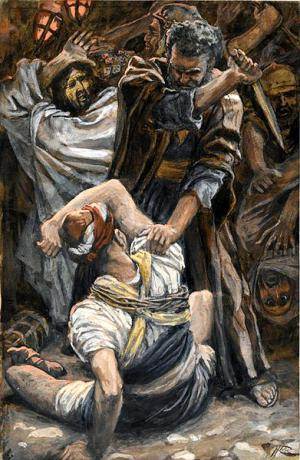 Dear Friends, Lent 2015 John #26
Dear Friends, Lent 2015 John #26
Chapter 17 is Jesus’ prayer as he ends his earthly ministry. As he told his disciples in chapter 15, Jesus again asserts he taught many things so that “they (his followers) would be filled with his joy.” Unlike the other gospels, where Jesus’ final prayer is one of agony in the Garden of Gethsemane, this prayer recorded in John is one of calm assurance that soon the full glory of God will be revealed. When Peter tries to intervene in Jesus’ arrest Jesus stops him with the words, “Shall I not drink from the cup of suffering my Father has given me?”
Blessings on your reading,
Pastor Sarah
John 17: 1— 18:11
After saying all these things, Jesus looked up to heaven and said, “Father, the hour has come. Glorify your Son so he can give glory back to you. For you have given him authority over everyone. He gives eternal life to each one you have given him. And this is the way to have eternal life—to know you, the only true God, and Jesus Christ, the one you sent to earth. I brought glory to you here on earth by completing the work you gave me to do. Now, Father, bring me into the glory we shared before the world began.
“I have revealed you to the ones you gave me from this world. They were always yours. You gave them to me, and they have kept your word. Now they know that everything I have is a gift from you, for I have passed on to them the message you gave me. They accepted it and know that I came from you, and they believe you sent me.
“My prayer is not for the world, but for those you have given me, because they belong to you. All who are mine belong to you, and you have given them to me, so they bring me glory. Now I am departing from the world; they are staying in this world, but I am coming to you. Holy Father, you have given me your name; now protect them by the power of your name so that they will be united just as we are. During my time here, I protected them by the power of the name you gave me. I guarded them so that not one was lost, except the one headed for destruction, as the Scriptures foretold.
“Now I am coming to you. I told them many things while I was with them in this world so they would be filled with my joy. I have given them your word. And the world hates them because they do not belong to the world, just as I do not belong to the world. I’m not asking you to take them out of the world, but to keep them safe from the evil one. They do not belong to this world any more than I do. Make them holy by your truth; teach them your word, which is truth. Just as you sent me into the world, I am sending them into the world. And I give myself as a holy sacrifice for them so they can be made holy by your truth.
“I am praying not only for these disciples but also for all who will ever believe in me through their message. I pray that they will all be one, just as you and I are one—as you are in me, Father, and I am in you. And may they be in us so that the world will believe you sent me.
“I have given them the glory you gave me, so they may be one as we are one. I am in them and you are in me. May they experience such perfect unity that the world will know that you sent me and that you love them as much as you love me. Father, I want these whom you have given me to be with me where I am. Then they can see all the glory you gave me because you loved me even before the world began!
“O righteous Father, the world doesn’t know you, but I do; and these disciples know you sent me. I have revealed you to them, and I will continue to do so. Then your love for me will be in them, and I will be in them.”
After saying these things, Jesus crossed the Kidron Valley with his disciples and entered a grove of olive trees. Judas, the betrayer, knew this place, because Jesus had often gone there with his disciples. The leading priests and Pharisees had given Judas a contingent of Roman soldiers and Temple guards to accompany him. Now with blazing torches, lanterns, and weapons, they arrived at the olive grove.
Jesus fully realized all that was going to happen to him, so he stepped forward to meet them. “Who are you looking for?” he asked.
“Jesus the Nazarene,” they replied.
“I am he,” Jesus said. (Judas, who betrayed him, was standing with them.) As Jesus said “I am he,” they all drew back and fell to the ground! Once more he asked them, “Who are you looking for?”
And again they replied, “Jesus the Nazarene.”
“I told you that I am he,” Jesus said. “And since I am the one you want, let these others go.” He did this to fulfill his own statement: “I did not lose a single one of those you have given me.”
Then Simon Peter drew a sword and slashed off the right ear of Malchus, the high priest’s slave. But Jesus said to Peter, “Put your sword back into its sheath. Shall I not drink from the cup of suffering the Father has given me?”
>>>>><<<<<
 Dear Friends, Lent 2015 John #25
Dear Friends, Lent 2015 John #25
Here is the chapter to read when the world has gotten you down. It is a word of assurance when violence and evil seem to have the upper hand and goodness and peace seem to be disappearing. Jesus tells us, “Here on earth you will have many trials and sorrows. But take heart, because I have overcome the world.” v 33
Jesus also expands on the work of the Holy Spirit. As followers of Jesus we hold the Bible to be our sacred text. But that is not the only method God uses to speak to us. Jesus explains to the disciples of the first century that there is more truth available from God than they can comprehend at that time. Jesus promises that the revealing of God’s truth will continue into the future as the Holy Spirit “guide[s] you into all truth.” v 13
How exciting to know that God has not been left behind in the first century but leads us into the future.
Blessings on your reading,
Pastor Sarah
John 16:1-33
“I have told you these things so that you won’t abandon your faith. For you will be expelled from the synagogues, and the time is coming when those who kill you will think they are doing a holy service for God. This is because they have never known the Father or me. Yes, I’m telling you these things now, so that when they happen, you will remember my warning. I didn’t tell you earlier because I was going to be with you for a while longer.
“But now I am going away to the one who sent me, and not one of you is asking where I am going. Instead, you grieve because of what I’ve told you. But in fact, it is best for you that I go away, because if I don’t, the Advocate won’t come. If I do go away, then I will send him to you. And when he comes, he will convict the world of its sin, and of God’s righteousness, and of the coming judgment. The world’s sin is that it refuses to believe in me. Righteousness is available because I go to the Father, and you will see me no more. Judgment will come because the ruler of this world has already been judged.
“There is so much more I want to tell you, but you can’t bear it now. When the Spirit of truth comes, he will guide you into all truth. He will not speak on his own but will tell you what he has heard. He will tell you about the future. He will bring me glory by telling you whatever he receives from me. All that belongs to the Father is mine; this is why I said, ‘The Spirit will tell you whatever he receives from me.’
“In a little while you won’t see me anymore. But a little while after that, you will see me again.”
Some of the disciples asked each other, “What does he mean when he says, ‘In a little while you won’t see me, but then you will see me,’ and ‘I am going to the Father’? And what does he mean by ‘a little while’? We don’t understand.”
Jesus realized they wanted to ask him about it, so he said, “Are you asking yourselves what I meant? I said in a little while you won’t see me, but a little while after that you will see me again. I tell you the truth, you will weep and mourn over what is going to happen to me, but the world will rejoice. You will grieve, but your grief will suddenly turn to wonderful joy. 21 It will be like a woman suffering the pains of labor. When her child is born, her anguish gives way to joy because she has brought a new baby into the world. So you have sorrow now, but I will see you again; then you will rejoice, and no one can rob you of that joy. At that time you won’t need to ask me for anything. I tell you the truth, you will ask the Father directly, and he will grant your request because you use my name. You haven’t done this before. Ask, using my name, and you will receive, and you will have abundant joy.
“I have spoken of these matters in figures of speech, but soon I will stop speaking figuratively and will tell you plainly all about the Father. Then you will ask in my name. I’m not saying I will ask the Father on your behalf, for the Father himself loves you dearly because you love me and believe that I came from God.[ b ] 28 Yes, I came from the Father into the world, and now I will leave the world and return to the Father.”
Then his disciples said, “At last you are speaking plainly and not figuratively. Now we understand that you know everything, and there’s no need to question you. From this we believe that you came from God.”
Jesus asked, “Do you finally believe? But the time is coming—indeed it’s here now—when you will be scattered, each one going his own way, leaving me alone. Yet I am not alone because the Father is with me. I have told you all this so that you may have peace in me. Here on earth you will have many trials and sorrows. But take heart, because I have overcome the world.”
>>>>><<<<<
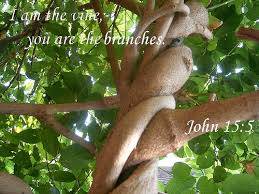 Dear Friends, Lent 2015 John #24
Dear Friends, Lent 2015 John #24
As I study today’s reading I am struck by how filled with emotion Jesus is as he talks for the last time with his disciples. He gives such beautiful final instructions, and warnings, to these whom he calls his friends. In the night before his death Jesus tells his disciples that everything he said and did was so “their joy will overflow.” v 11
Remember as you read this that Jesus is speaking directly to you.
Blessings on your reading,
Pastor Sarah
John 15:1-26
| “I am the true grapevine, and my Father is the gardener. He cuts off every branch of mine that doesn’t produce fruit, and he prunes the branches that do bear fruit so they will produce even more. You have already been pruned and purified by the message I have given you. Remain in me, and I will remain in you. For a branch cannot produce fruit if it is severed from the vine, and you cannot be fruitful unless you remain in me.“Yes, I am the vine; you are the branches. Those who remain in me, and I in them, will produce much fruit. For apart from me you can do nothing. Anyone who does not remain in me is thrown away like a useless branch and withers. Such branches are gathered into a pile to be burned. But if you remain in me and my words remain in you, you may ask for anything you want, and it will be granted! When you produce much fruit, you are my true disciples. This brings great glory to my Father. “I have loved you even as the Father has loved me. Remain in my love. When you obey my commandments, you remain in my love, just as I obey my Father’s commandments and remain in his love. I have told you these things so that you will be filled with my joy. Yes, your joy will overflow! This is my commandment: Love each other in the same way I have loved you. There is no greater love than to lay down one’s life for one’s friends. You are my friends if you do what I command. I no longer call you slaves, because a master doesn’t confide in his slaves. Now you are my friends, since I have told you everything the Father told me. You didn’t choose me. I chose you. I appointed you to go and produce lasting fruit, so that the Father will give you whatever you ask for, using my name. 17 This is my command: Love each other. “If the world hates you, remember that it hated me first. The world would love you as one of its own if you belonged to it, but you are no longer part of the world. I chose you to come out of the world, so it hates you. Do you remember what I told you? ‘A slave is not greater than the master.’ Since they persecuted me, naturally they will persecute you. And if they had listened to me, they would listen to you. They will do all this to you because of me, for they have rejected the one who sent me. They would not be guilty if I had not come and spoken to them. But now they have no excuse for their sin. Anyone who hates me also hates my Father. If I hadn’t done such miraculous signs among them that no one else could do, they would not be guilty. But as it is, they have seen everything I did, yet they still hate me and my Father. This fulfills what is written in their Scriptures: ‘They hated me without cause.’ Psalm 35:19, 69:4
“But I will send you the Advocate—the Spirit of truth. He will come to you from the Father and will testify all about me. And you must also testify about me because you have been with me from the beginning of my ministry. >>>>><<<<< |
 Dear Friends, Lent 2015 John #23
Dear Friends, Lent 2015 John #23
Chapters 13 through 17 are traditionally called the “Farewell Discourses” of Jesus. The material is found only in John, although there are a few parallels in the other gospels. As we read you will probably rediscover some of your favorite Biblical passages.
Parts of chapter 14 are commonly used in funeral services because of their comforting words. And it contains a verse that has strengthened and comforted me so often throughout my life: “Peace I leave with you. My peace I give to you. I do not give to you as the world gives. Do not let your hearts be troubled, and do not let them be afraid.” v 27 NRSV
In this chapter Jesus promises to send the Holy Spirit so we will never be alone or “orphaned.” He again identifies himself completely with the Father: “I am in the Father and the Father is in me.” v 10
There is always more to discover as we read scripture. My “discovery” for today? I don’t remember reading verse 22 where Jesus is directly asked why he does not reveal himself to the whole world. I don’t find the answer satisfying. What do you think?
Blessings on your reading,
Pastor Sarah
John 14:1-31
“Don’t let your hearts be troubled. Trust in God, and trust also in me. There is more than enough room in my Father’s home. If this were not so, would I have told you that I am going to prepare a place for you? When everything is ready, I will come and get you, so that you will always be with me where I am. And you know the way to where I am going.”
“No, we don’t know, Lord,” Thomas said. “We have no idea where you are going, so how can we know the way?”
Jesus told him, “I am the way, the truth, and the life. No one can come to the Father except through me. If you had really known me, you would know who my Father is. From now on, you do know him and have seen him!”
Philip said, “Lord, show us the Father, and we will be satisfied.”
Jesus replied, “Have I been with you all this time, Philip, and yet you still don’t know who I am? Anyone who has seen me has seen the Father! So why are you asking me to show him to you? Don’t you believe that I am in the Father and the Father is in me? The words I speak are not my own, but my Father who lives in me does his work through me. Just believe that I am in the Father and the Father is in me. Or at least believe because of the work you have seen me do.
“I tell you the truth, anyone who believes in me will do the same works I have done, and even greater works, because I am going to be with the Father.
You can ask for anything in my name, and I will do it, so that the Son can bring glory to the Father. Yes, ask me for anything in my name, and I will do it!
“If you love me, obey my commandments. And I will ask the Father, and he will give you another Advocate, who will never leave you. He is the Holy Spirit, who leads into all truth. The world cannot receive him, because it isn’t looking for him and doesn’t recognize him. But you know him, because he lives with you now and later will be in you. No, I will not abandon you as orphans—I will come to you. Soon the world will no longer see me, but you will see me. Since I live, you also will live. When I am raised to life again, you will know that I am in my Father, and you are in me, and I am in you. Those who accept my commandments and obey them are the ones who love me. And because they love me, my Father will love them. And I will love them and reveal myself to each of them.”
22 Judas (not Judas Iscariot, but the other disciple with that name) said to him, “Lord, why are you going to reveal yourself only to us and not to the world at large?”
Jesus replied, “All who love me will do what I say. My Father will love them, and we will come and make our home with each of them. Anyone who doesn’t love me will not obey me. And remember, my words are not my own. What I am telling you is from the Father who sent me. I am telling you these things now while I am still with you. But when the Father sends the Advocate as my representative—that is, the Holy Spirit—he will teach you everything and will remind you of everything I have told you.
27 “I am leaving you with a gift—peace of mind and heart. And the peace I give is a gift the world cannot give. So don’t be troubled or afraid. Remember what I told you: I am going away, but I will come back to you again. If you really loved me, you would be happy that I am going to the Father, who is greater than I am. I have told you these things before they happen so that when they do happen, you will believe.
“I don’t have much more time to talk to you, because the ruler of this world approaches. He has no power over me, but I will do what the Father requires of me, so that the world will know that I love the Father. Come, let’s be going.
>>>>><<<<<
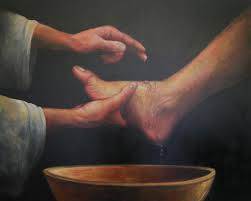 Dear Friends, Lent 2015 John #22
Dear Friends, Lent 2015 John #22
In the three synoptic gospels (Matthew, Mark and Luke) the last supper Jesus eats with his disciples is a Seder meal on the first night of Passover. As they follow the traditional rituals of the Seder meal, Jesus institutes the sacrament of Holy Communion.
John describes a completely different last supper. As we read today, it is not yet Passover when Jesus eats his final meal. And Jesus is crucified the next day at the same time that lambs are being slaughtered in the temple for use in that evening’s first Passover Seder.
So there is no bread and wine mentioned in John’s last supper, but there is another enduring symbol of Jesus’ love as he washes the feet of his disciples. He tells them to love others with this same humble service, adding that to do so is to find the path of blessing. v.17
Blessings on your reading,
Pastor Sarah
John 13:1-38
Before the Passover celebration, Jesus knew that his hour had come to leave this world and return to his Father. He had loved his disciples during his ministry on earth, and now he loved them to the very end. It was time for supper, and the devil had already prompted Judas, son of Simon Iscariot, to betray Jesus. Jesus knew that the Father had given him authority over everything and that he had come from God and would return to God. So he got up from the table, took off his robe, wrapped a towel around his waist, and poured water into a basin. Then he began to wash the disciples’ feet, drying them with the towel he had around him.
When Jesus came to Simon Peter, Peter said to him, “Lord, are you going to wash my feet?”
Jesus replied, “You don’t understand now what I am doing, but someday you will.”
“No,” Peter protested, “you will never ever wash my feet!”
Jesus replied, “Unless I wash you, you won’t belong to me.”
Simon Peter exclaimed, “Then wash my hands and head as well, Lord, not just my feet!”
Jesus replied, “A person who has bathed all over does not need to wash, except for the feet, to be entirely clean. And you disciples are clean, but not all of you.” For Jesus knew who would betray him. That is what he meant when he said, “Not all of you are clean.”
After washing their feet, he put on his robe again and sat down and asked, “Do you understand what I was doing? You call me ‘Teacher’ and ‘Lord,’ and you are right, because that’s what I am. And since I, your Lord and Teacher, have washed your feet, you ought to wash each other’s feet. I have given you an example to follow. Do as I have done to you. I tell you the truth, slaves are not greater than their master. Nor is the messenger more important than the one who sends the message. 17 Now that you know these things, God will bless you for doing them.
“I am not saying these things to all of you; I know the ones I have chosen. But this fulfills the Scripture that says, ‘The one who eats my food has turned against me.’ I tell you this beforehand, so that when it happens you will believe that I am the Messiah. I tell you the truth, anyone who welcomes my messenger is welcoming me, and anyone who welcomes me is welcoming the Father who sent me.”
Now Jesus was deeply troubled, and he exclaimed, “I tell you the truth; one of you will betray me!”
The disciples looked at each other, wondering whom he could mean. The disciple Jesus loved was sitting next to Jesus at the table. Simon Peter motioned to him to ask, “Who’s he talking about?” So that disciple leaned over to Jesus and asked, “Lord, who is it?”
Jesus responded, “It is the one to whom I give the bread I dip in the bowl.” And when he had dipped it, he gave it to Judas, son of Simon Iscariot. When Judas had eaten the bread, Satan entered into him. Then Jesus told him, “Hurry and do what you’re going to do.” None of the others at the table knew what Jesus meant. Since Judas was their treasurer, some thought Jesus was telling him to go and pay for the food or to give some money to the poor. So Judas left at once, going out into the night.
As soon as Judas left the room, Jesus said, “The time has come for the Son of Man to enter into his glory, and God will be glorified because of him. And since God receives glory because of the Son, he will give his own glory to the Son, and he will do so at once. Dear children, I will be with you only a little longer. And as I told the Jewish leaders, you will search for me, but you can’t come where I am going. So now I am giving you a new commandment: Love each other. Just as I have loved you, you should love each other. Your love for one another will prove to the world that you are my disciples.”
Simon Peter asked, “Lord, where are you going?”
And Jesus replied, “You can’t go with me now, but you will follow me later.”
“But why can’t I come now, Lord?” he asked. “I’m ready to die for you.”
Jesus answered, “Die for me? I tell you the truth, Peter—before the rooster crows tomorrow morning, you will deny three times that you even know me.
>>>>><<<<<
 Dear Friends, Lent 2015 John #21
Dear Friends, Lent 2015 John #21
In chapter 11 the people were asking, “Will he (Jesus) show up for Passover?” v 56 Did he ever show up! His procession into Jerusalem was a searing parody of the way Roman officials processed into Jerusalem. That same day, according to author Marcus Borg, Pontius Pilate was arriving in Jerusalem riding on a white horse and accompanied by soldiers in a show of Roman strength for the Passover pilgrims. Jesus’ procession on a donkey was his declaration that the Kingdom of God does not follow the rules of the world. His power is displayed in weakness, in compassion and serving, in forgiveness and in love.
In a memorable line referring to Palm Sunday one of the Pharisees says, “We’ve lost. Look, the whole world has gone after him.” But of course crowds are fickle and by the end of the week the people would be calling for Jesus’ crucifixion.
This reading includes the voice of God answering a question from Jesus. In John’s gospel God is not heard during Jesus baptism and there is no scene of the Transfiguration as in the other gospels. Jesus tells the crowd that God spoke for their benefit, but not everyone agreed on what they had heard.
Blessings on your reading as we begin Holy Week,
Pastor Sarah
John 12:12-50
The next day, the news that Jesus was on the way to Jerusalem swept through the city. A large crowd of Passover visitors took palm branches and went down the road to meet him. They shouted,
“Praise God!
Blessings on the one who comes in the name of the Lord!
Hail to the King of Israel!”
Jesus found a young donkey and rode on it, fulfilling the prophecy that said:
“Don’t be afraid, people of Jerusalem.
Look, your King is coming,
riding on a donkey’s colt.”
His disciples didn’t understand at the time that this was a fulfillment of prophecy. But after Jesus entered into his glory, they remembered what had happened and realized that these things had been written about him.
Many in the crowd had seen Jesus call Lazarus from the tomb, raising him from the dead, and they were telling others about it. That was the reason so many went out to meet him—because they had heard about this miraculous sign. Then the Pharisees said to each other, “There’s nothing we can do. Look, everyone has gone after him!”
Some Greeks who had come to Jerusalem for the Passover celebration paid a visit to Philip, who was from Bethsaida in Galilee. They said, “Sir, we want to meet Jesus.” Philip told Andrew about it, and they went together to ask Jesus.
Jesus replied, “Now the time has come for the Son of Man to enter into his glory. I tell you the truth, unless a kernel of wheat is planted in the soil and dies, it remains alone. But its death will produce many new kernels—a plentiful harvest of new lives. Those who love their life in this world will lose it. Those who care nothing for their life in this world will keep it for eternity. Anyone who wants to serve me must follow me, because my servants must be where I am. And the Father will honor anyone who serves me.
“Now my soul is deeply troubled. Should I pray, ‘Father, save me from this hour’? But this is the very reason I came! Father, bring glory to your name.”
Then a voice spoke from heaven, saying, “I have already brought glory to my name, and I will do so again.” When the crowd heard the voice, some thought it was thunder, while others declared an angel had spoken to him.
Then Jesus told them, “The voice was for your benefit, not mine. The time for judging this world has come, when Satan, the ruler of this world, will be cast out. And when I am lifted up from the earth, I will draw everyone to myself.” He said this to indicate how he was going to die.
The crowd responded, “We understood from Scripture that the Messiah would live forever. How can you say the Son of Man will die? Just who is this Son of Man, anyway?”
Jesus replied, “My light will shine for you just a little longer. Walk in the light while you can, so the darkness will not overtake you. Those who walk in the darkness cannot see where they are going. Put your trust in the light while there is still time; then you will become children of the light.”
After saying these things, Jesus went away and was hidden from them.
But despite all the miraculous signs Jesus had done, most of the people still did not believe in him. This is exactly what Isaiah the prophet had predicted:
“Lord, who has believed our message?
To whom has the Lord revealed his powerful arm?” Isaiah 53:1
But the people couldn’t believe, for as Isaiah also said,
“The Lord has blinded their eyes
and hardened their hearts—
so that their eyes cannot see,
and their hearts cannot understand,
and they cannot turn to me
and have me heal them.” Isaiah 6:10
Isaiah was referring to Jesus when he said this, because he saw the future and spoke of the Messiah’s glory. Many people did believe in him, however, including some of the Jewish leaders. But they wouldn’t admit it for fear that the Pharisees would expel them from the synagogue. For they loved human praise more than the praise of God.
Jesus shouted to the crowds, “If you trust me, you are trusting not only me, but also God who sent me. For when you see me, you are seeing the one who sent me. I have come as a light to shine in this dark world, so that all who put their trust in me will no longer remain in the dark. I will not judge those who hear me but don’t obey me, for I have come to save the world and not to judge it. But all who reject me and my message will be judged on the Day of Judgment by the truth I have spoken. I don’t speak on my own authority. The Father who sent me has commanded me what to say and how to say it. And I know his commands lead to eternal life; so I say whatever the Father tells me to say.”
>>>>><<<<<
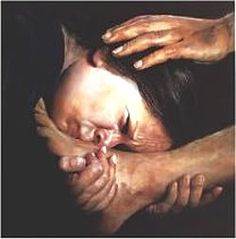 Dear Friends, Lent 2015 John #20
Dear Friends, Lent 2015 John #20
When Jesus raised Lazarus from the dead it caught the attention of everyone! For many, this miraculous sign convinced them Jesus was the messiah. But for the Jewish authorities it was a sign of great danger.
A picture of the high priest Caiaphas could illustrate the word expediency: “a regard for what is politic or advantageous rather than for what is right or just.” Caiaphas had to have been keenly aware of the politics involved in keeping his position under Roman rule. His plan to kill Jesus was based on his belief that it is better “that one man should die for the people than for the whole nation to be destroyed.” v 50 Sadly, some politicians ever since that time have used Caiaphas’ reasoning when faced with the cost of doing the “right or just” thing.
There is another verse from this section of scripture that is heard in political discussions. Jesus is often quoted by those who do not want to do more to help those who are poor: “The poor you will have with you always.” v 8 They interpret the statement to mean that it’s not possible to end poverty, so consequently we don’t have to try.
Jesus was quoting Deuteronomy 15:11 “There will always be some in the land who are poor. That is why I am commanding you to share freely with the poor and with other Israelites in need.” Jesus was joining other rabbis of the time in using a technique called remez, in which the rabbi quoted a small piece of scripture with the intent of calling to mind the larger passage it came from. So actually, while appreciating Mary’s gesture (after all Jesus was one of the poor!) of anointing him for burial, he was also reminding his disciples to continue to care for the poor.
Blessings on your reading,
Pastor Sarah
John 11:45—12:11
Many of the people who were with Mary believed in Jesus when they saw this happen. But some went to the Pharisees and told them what Jesus had done. Then the leading priests and Pharisees called the high council together. “What are we going to do?” they asked each other. “This man certainly performs many miraculous signs. If we allow him to go on like this, soon everyone will believe in him. Then the Roman army will come and destroy both our Temple and our nation.”
Caiaphas, who was high priest at that time, said, “You don’t know what you’re talking about! You don’t realize that it’s better for you that one man should die for the people than for the whole nation to be destroyed.”
He did not say this on his own; as high priest at that time he was led to prophesy that Jesus would die for the entire nation. And not only for that nation, but to bring together and unite all the children of God scattered around the world.
So from that time on, the Jewish leaders began to plot Jesus’ death. As a result, Jesus stopped his public ministry among the people and left Jerusalem. He went to a place near the wilderness, to the village of Ephraim, and stayed there with his disciples.
It was now almost time for the Jewish Passover celebration, and many people from all over the country arrived in Jerusalem several days early so they could go through the purification ceremony before Passover began. They kept looking for Jesus, but as they stood around in the Temple, they said to each other, “What do you think? He won’t come for Passover, will he?” Meanwhile, the leading priests and Pharisees had publicly ordered that anyone seeing Jesus must report it immediately so they could arrest him.
Six days before the Passover celebration began, Jesus arrived in Bethany, the home of Lazarus—the man he had raised from the dead. A dinner was prepared in Jesus’ honor. Martha served, and Lazarus was among those who ate with him. Then Mary took a twelve-ounce jar of expensive perfume made from essence of nard, and she anointed Jesus’ feet with it, wiping his feet with her hair. The house was filled with the fragrance.
But Judas Iscariot, the disciple who would soon betray him, said, “That perfume was worth a year’s wages. It should have been sold and the money given to the poor.” Not that he cared for the poor—he was a thief, and since he was in charge of the disciples’ money, he often stole some for himself.
Jesus replied, “Leave her alone. She did this in preparation for my burial. You will always have the poor among you, but you will not always have me.”
When all the people heard of Jesus’ arrival, they flocked to see him and also to see Lazarus, the man Jesus had raised from the dead. Then the leading priests decided to kill Lazarus, too, for it was because of him that many of the people had deserted them and believed in Jesus.
>>>>><<<<<
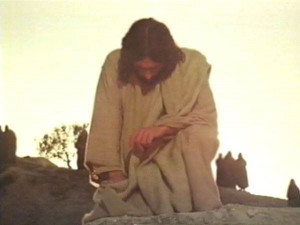 Dear Friends, Lent 2015 John #19
Dear Friends, Lent 2015 John #19
One of the reasons I love the story of Jesus raising Lazarus from the dead is that we are presented with a very human Jesus. First we realize that in addition to his disciples and followers, Jesus also has friends: “Lord, your dear friend is very sick.” v 3 And then we see Jesus exhibit a wide range of emotions. He is angry, he is troubled, and he openly weeps. Throughout his gospel John paints a picture of Jesus that emphasizes his divinity, yet here we clearly see his dual nature.
Notice that in the argument with his disciples about the safety of going to back to Judea, the disciple who finally urges them all to accompany Jesus is Thomas. He speaks up again in John 14, interrupting Jesus to tell him the disciples don’t know or understand where he is going. After the resurrection Thomas is the one who needs to see for himself before he believes Jesus is alive.
We know that John’s gospel contains many stories that the other gospels do not, including this story of raising Lazarus. I have always wondered how such a vitally important story was not included in the other three gospels. Not only is it perhaps his greatest miracle, but in John it is also the final straw for the Jewish leaders who will create a plan to arrest and kill Jesus. In the other gospels the “final straw” is Jesus clearing the moneychangers out of the temple.
Blessings on your reading,
Pastor Sarah
John 11:1-44
| A man named Lazarus was sick. He lived in Bethany with his sisters, Mary and Martha. This is the Mary who later poured the expensive perfume on the Lord’s feet and wiped them with her hair. Her brother, Lazarus, was sick. So the two sisters sent a message to Jesus telling him, “Lord, your dear friend is very sick.” But when Jesus heard about it he said, “Lazarus’s sickness will not end in death. No, it happened for the glory of God so that the Son of God will receive glory from this.” So although Jesus loved Martha, Mary, and Lazarus, he stayed where he was for the next two days. Finally, he said to his disciples, “Let’s go back to Judea.” But his disciples objected. “Rabbi,” they said, “only a few days ago the people in Judea were trying to stone you. Are you going there again?” Jesus replied, “There are twelve hours of daylight every day. During the day people can walk safely. They can see because they have the light of this world. But at night there is danger of stumbling because they have no light.” Then he said, “Our friend Lazarus has fallen asleep, but now I will go and wake him up.”The disciples said, “Lord, if he is sleeping, he will soon get better!” They thought Jesus meant Lazarus was simply sleeping, but Jesus meant Lazarus had died.So he told them plainly, “Lazarus is dead. And for your sakes, I’m glad I wasn’t there, for now you will really believe. Come, let’s go see him.”Thomas, nicknamed the Twin, said to his fellow disciples, “Let’s go, too—and die with Jesus.”When Jesus arrived at Bethany, he was told that Lazarus had already been in his grave for four days. Bethany was only a few miles down the road from Jerusalem, and many of the people had come to console Martha and Mary in their loss. When Martha got word that Jesus was coming, she went to meet him. But Mary stayed in the house. Martha said to Jesus, “Lord, if only you had been here, my brother would not have died. But even now I know that God will give you whatever you ask.” Jesus told her, “Your brother will rise again.” “Yes,” Martha said, “he will rise when everyone else rises, at the last day.”Jesus told her, “I am the resurrection and the life. Anyone who believes in me will live, even after dying. 26 Everyone who lives in me and believes in me will never ever die. Do you believe this, Martha?”“Yes, Lord,” she told him. “I have always believed you are the Messiah, the Son of God, the one who has come into the world from God.” Then she returned to Mary. She called Mary aside from the mourners and told her, “The Teacher is here and wants to see you.” So Mary immediately went to him. Jesus had stayed outside the village, at the place where Martha met him. When the people who were at the house consoling Mary saw her leave so hastily, they assumed she was going to Lazarus’s grave to weep. So they followed her there. When Mary arrived and saw Jesus, she fell at his feet and said, “Lord, if only you had been here, my brother would not have died.” When Jesus saw her weeping and saw the other people wailing with her, a deep anger welled up within him, and he was deeply troubled. “Where have you put him?” he asked them.They told him, “Lord, come and see.” Then Jesus wept. The people who were standing nearby said, “See how much he loved him!” But some said, “This man healed a blind man. Couldn’t he have kept Lazarus from dying?”Jesus was still angry as he arrived at the tomb, a cave with a stone rolled across its entrance. “Roll the stone aside,” Jesus told them.But Martha, the dead man’s sister, protested, “Lord, he has been dead for four days. The smell will be terrible.”Jesus responded, “Didn’t I tell you that you would see God’s glory if you believe?” So they rolled the stone aside. Then Jesus looked up to heaven and said, “Father, thank you for hearing me. You always hear me, but I said it out loud for the sake of all these people standing here, so that they will believe you sent me.” Then Jesus shouted, “Lazarus, come out!” 44 And the dead man came out, his hands and feet bound in grave clothes, his face wrapped in a head cloth. Jesus told them, “Unwrap him and let him go!” |
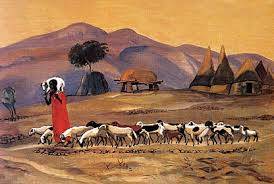 Dear Friends, Lent 2015 John #18
Dear Friends, Lent 2015 John #18
Jesus explained that he performed signs (“the work I do”) so people would believe that he was the Messiah. But that made those who were comfortable with the status quo angry. Again in today’s reading the Jewish leaders picked up stones to kill Jesus, enraged that he said he was God: “The Father and I are one.” v 30 “The Father is in me and I am in the Father.” v 38
At the end of this chapter Jesus appears to turn his back on the leaders and rituals of the Jewish religion and leaves the temple. He does not return again. He continues to teach and perform miracles in the country side and doesn’t return to Jerusalem until Passover.
Blessings on your reading,
Pastor Sarah
John 10:22-42
It was now winter and Jesus was in Jerusalem at the time of Hanukkah, the Festival of Dedication. He was in the Temple, walking through the section known as Solomon’s Colonnade. The people surrounded him and asked, “How long are you going to keep us in suspense? If you are the Messiah, tell us plainly.”
Jesus replied, “I have already told you, and you don’t believe me. The proof is the work I do in my Father’s name. But you don’t believe me because you are not my sheep. My sheep listen to my voice; I know them, and they follow me. I give them eternal life, and they will never perish. No one can snatch them away from me, for my Father has given them to me, and he is more powerful than anyone else. No one can snatch them from the Father’s hand. The Father and I are one.”
Once again the people picked up stones to kill him. Jesus said, “At my Father’s direction I have done many good works. For which one are you going to stone me?”
They replied, “We’re stoning you not for any good work, but for blasphemy! You, a mere man, claim to be God.”
Jesus replied, “It is written in your own Scriptures that God said to certain leaders of the people, ‘I say, you are gods!’ And you know that the Scriptures cannot be altered. So if those people who received God’s message were called ‘gods,’ why do you call it blasphemy when I say, ‘I am the Son of God’? After all, the Father set me apart and sent me into the world. Don’t believe me unless I carry out my Father’s work. But if I do his work, believe in the evidence of the miraculous works I have done, even if you don’t believe me. Then you will know and understand that the Father is in me, and I am in the Father.”
Once again they tried to arrest him, but he got away and left them. He went beyond the Jordan River near the place where John was first baptizing and stayed there awhile. And many followed him. “John didn’t perform miraculous signs,” they remarked to one another, “but everything he said about this man has come true.” And many who were there believed in Jesus.
>>>>><<<<<
Dear Friends, Lent 2015 John #17
Chapter 10 contains the popular Good Shepherd metaphors that are unique to John. The lectionary divides the chapter into three separate readings and schedules them for the 4th Sunday in Easter in each of the three years in the Sunday worship cycle.
Even though few of us have had any direct contact with a shepherd we can understand why Jesus calls himself our shepherd. We are like sheep, helpless and lost without our Shepherd. “I am the Good Shepherd” is certainly one of the most enduring and loved verses in the Bible.
We will read the second half of the chapter tomorrow.
Blessings on your reading,
Pastor Sarah
“I tell you the truth, anyone who sneaks over the wall of a sheepfold, rather than going through the gate, must surely be a thief and a robber! But the one who enters through the gate is the shepherd of the sheep. The gatekeeper opens the gate for him, and the sheep recognize his voice and come to him. He calls his own sheep by name and leads them out. After he has gathered his own flock, he walks ahead of them, and they follow him because they know his voice. They won’t follow a stranger; they will run from him because they don’t know his voice.”
Those who heard Jesus use this illustration didn’t understand what he meant, so he explained it to them: “I tell you the truth; I am the gate for the sheep. All who came before me were thieves and robbers. But the true sheep did not listen to them. Yes, I am the gate. Those who come in through me will be saved. They will come and go freely and will find good pastures. The thief’s purpose is to steal and kill and destroy. My purpose is to give them a rich and satisfying life.
“I am the good shepherd. The good shepherd sacrifices his life for the sheep. A hired hand will run when he sees a wolf coming. He will abandon the sheep because they don’t belong to him and he isn’t their shepherd. And so the wolf attacks them and scatters the flock. The hired hand runs away because he’s working only for the money and doesn’t really care about the sheep.
“I am the good shepherd; I know my own sheep, and they know me, just as my Father knows me and I know the Father. So I sacrifice my life for the sheep. I have other sheep, too, that are not in this sheepfold. I must bring them also. They will listen to my voice, and there will be one flock with one shepherd.
“The Father loves me because I sacrifice my life so I may take it back again. No one can take my life from me. I sacrifice it voluntarily. For I have the authority to lay it down when I want to and also to take it up again. For this is what my Father has commanded.”
When he said these things, the people were again divided in their opinions about him. Some said, “He’s demon possessed and out of his mind. Why listen to a man like that?” Others said, “This doesn’t sound like a man possessed by a demon! Can a demon open the eyes of the blind?”
Dear Friends, Lent 2015 John 16
Chapter 9 is easier reading than what we’ve just finished in chapter 8. Have you noticed that there are no parables in John? Jesus teaches through his actions or in long discourses, but no parables are recorded.
I think we all have a series of “Why?” questions we want to ask God. In today’s reading the disciples ask one of these, “Why was this man born blind?”
Blessings on your reading,
Pastor Sarah
As Jesus was walking along, he saw a man who had been blind from birth. “Rabbi,” his disciples asked him, “why was this man born blind? Was it because of his own sins or his parents’ sins?”
“It was not because of his sins or his parents’ sins,” Jesus answered. “This happened so the power of God could be seen in him. We must quickly carry out the tasks assigned us by the one who sent us. The night is coming, and then no one can work. But while I am here in the world, I am the light of the world.”
Then he spit on the ground, made mud with the saliva, and spread the mud over the blind man’s eyes. He told him, “Go wash yourself in the pool of Siloam” (Siloam means “sent”). So the man went and washed and came back seeing!
His neighbors and others who knew him as a blind beggar asked each other, “Isn’t this the man who used to sit and beg?” Some said he was, and others said, “No, he just looks like him!”
But the beggar kept saying, “Yes, I am the same one!”
They asked, “Who healed you? What happened?”
He told them, “The man they call Jesus made mud and spread it over my eyes and told me, ‘Go to the pool of Siloam and wash yourself.’ So I went and washed, and now I can see!”
“Where is he now?” they asked.
“I don’t know,” he replied.
Then they took the man who had been blind to the Pharisees, because it was on the Sabbath that Jesus had made the mud and healed him. The Pharisees asked the man all about it. So he told them, “He put the mud over my eyes, and when I washed it away, I could see!”
Some of the Pharisees said, “This man Jesus is not from God, for he is working on the Sabbath.” Others said, “But how could an ordinary sinner do such miraculous signs?” So there was a deep division of opinion among them.
Then the Pharisees again questioned the man who had been blind and demanded, “What’s your opinion about this man who healed you?”
The man replied, “I think he must be a prophet.”
The Jewish leaders still refused to believe the man had been blind and could now see, so they called in his parents. They asked them, “Is this your son? Was he born blind? If so, how can he now see?”
His parents replied, “We know this is our son and that he was born blind, but we don’t know how he can see or who healed him. Ask him. He is old enough to speak for himself.” His parents said this because they were afraid of the Jewish leaders, who had announced that anyone saying Jesus was the Messiah would be expelled from the synagogue. That’s why they said, “He is old enough. Ask him.”
So for the second time they called in the man who had been blind and told him, “God should get the glory for this, because we know this man Jesus is a sinner.”
“I don’t know whether he is a sinner,” the man replied. “But I know this: I was blind, and now I can see!”
“But what did he do?” they asked. “How did he heal you?”
“Look!” the man exclaimed. “I told you once. Didn’t you listen? Why do you want to hear it again? Do you want to become his disciples, too?”
Then they cursed him and said, “You are his disciple, but we are disciples of Moses! We know God spoke to Moses, but we don’t even know where this man comes from.”
“Why, that’s very strange!” the man replied. “He healed my eyes, and yet you don’t know where he comes from? We know that God doesn’t listen to sinners, but he is ready to hear those who worship him and do his will. Ever since the world began, no one has been able to open the eyes of someone born blind. If this man were not from God, he couldn’t have done it.”
“You were born a total sinner!” they answered. “Are you trying to teach us?” And they threw him out of the synagogue.
When Jesus heard what had happened, he found the man and asked, “Do you believe in the Son of Man?”
The man answered, “Who is he, sir? I want to believe in him.”
“You have seen him,” Jesus said, “and he is speaking to you!”
“Yes, Lord, I believe!” the man said. And he worshiped Jesus.
Then Jesus told him, “I entered this world to render judgment—to give sight to the blind and to show those who think they see that they are blind.”
Some Pharisees who were standing nearby heard him and asked, “Are you saying we’re blind?”
“If you were blind, you wouldn’t be guilty,” Jesus replied. “But you remain guilty because you claim you can see.
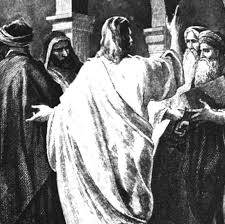 Dear Friends, Lent 2015 John #15
Dear Friends, Lent 2015 John #15
A portion of today’s reading, John 8:31-36, is the designated gospel lesson for Reformation Sunday, although no other verses are part of the RCL for use in Sunday worship. In this passage Jesus promises freedom for those who believe in the truth that he teaches.
The remainder of the temple conversation becomes increasingly hostile. Jesus tells his opponents: “you are the children of your father the devil, and you love to do the evil things he does.“ Passages like this have unfortunately led some Christians to the sin of anti-Semitism. As readers we must understand the historical context. The author of John was a Jew, Jesus was a Jew, and the first readers of this gospel were Jews. So when we read the words “the Jews” we should really translate it as “the Jewish authorities.”
Another “I AM” statement by Jesus ends this conversation. ““I tell you the truth, before Abraham was even born, I am!” v 58 This so enrages the authorities that they attempt to stone him.
As I try to picture what this scene was like, I can more easily imagine the hatred that the authorities felt for Jesus. It was that hatred that led to his execution.
Blessings on your reading,
Pastor Sarah
John 8:31-58
Jesus said to the people who believed in him, “You are truly my disciples if you remain faithful to my teachings. And you will know the truth, and the truth will set you free.”
“But we are descendants of Abraham,” they said. “We have never been slaves to anyone. What do you mean, ‘You will be set free’?”
Jesus replied, “I tell you the truth, everyone who sins is a slave of sin. A slave is not a permanent member of the family, but a son is part of the family forever. So if the Son sets you free, you are truly free.
37 Yes, I realize that you are descendants of Abraham. And yet some of you are trying to kill me because there’s no room in your hearts for my message. I am telling you what I saw when I was with my Father. But you are following the advice of your father.”
“Our father is Abraham!” they declared.
“No,” Jesus replied, “for if you were really the children of Abraham, you would follow his example. Instead, you are trying to kill me because I told you the truth, which I heard from God. Abraham never did such a thing. No, you are imitating your real father.”
They replied, “We aren’t illegitimate children! God himself is our true Father.”
Jesus told them, “If God were your Father, you would love me, because I have come to you from God. I am not here on my own, but he sent me. Why can’t you understand what I am saying? It’s because you can’t even hear me! For you are the children of your father the devil, and you love to do the evil things he does. He was a murderer from the beginning. He has always hated the truth, because there is no truth in him. When he lies, it is consistent with his character; for he is a liar and the father of lies. So when I tell the truth, you just naturally don’t believe me! Which of you can truthfully accuse me of sin? And since I am telling you the truth, why don’t you believe me? Anyone who belongs to God listens gladly to the words of God. But you don’t listen because you don’t belong to God.”
The people retorted, “You Samaritan devil! Didn’t we say all along that you were possessed by a demon?”
“No,” Jesus said, “I have no demon in me. For I honor my Father—and you dishonor me. And though I have no wish to glorify myself, God is going to glorify me. He is the true judge. I tell you the truth, anyone who obeys my teaching will never die!”
The people said, “Now we know you are possessed by a demon. Even Abraham and the prophets died, but you say, ‘Anyone who obeys my teaching will never die!’ Are you greater than our father Abraham? He died, and so did the prophets. Who do you think you are?”
Jesus answered, “If I want glory for myself, it doesn’t count. But it is my Father who will glorify me. You say, ‘He is our God,’ but you don’t even know him. I know him. If I said otherwise, I would be as great a liar as you! But I do know him and obey him. Your father Abraham rejoiced as he looked forward to my coming. He saw it and was glad.”
The people said, “You aren’t even fifty years old. How can you say you have seen Abraham?”
Jesus answered, “I tell you the truth, before Abraham was even born, I am!” At that point they picked up stones to throw at him. But Jesus was hidden from them and left the Temple.
Dear Friends, Lent 2015 John #14
Chapter 8 begins and ends in the temple with threats of stoning. It begins with a woman allegedly caught in adultery being brought to Jesus so he can affirm the Law which requires stoning as the punishment for adultery. And it ends with another group of people so angry at Jesus for his teaching that “they picked up stones to throw at him.” v.59
In Matthew Jesus told his disciples “You are the light of the world.” Now in John 8:12 Jesus says, “I am the light of the world.” Jesus is recorded making more bold statements about his identity in John than in the other gospels.
Throughout chapter 8 Jesus is not just teaching his disciples, but is teaching a large crowd that includes scribes and Pharisees—a different audience than the common folks he has previously addressed. His attitude towards this crowd is condescending: “You are from below, I am from above.” v23 and he wonders out loud, “Why do I speak to you at all?” v 25
There is so much packed into each chapter of John that perhaps this was not the best choice of a book to read in the time period of Lent. I am somewhat frustrated by having to move so quickly.
One final note today: in verse 28 Jesus utters another “I AM” statement, referring to Exodus 3:14.
Blessings on your reading,
Pastor Sarah
John 8:1-30
Jesus returned to the Mount of Olives, but early the next morning he was back again at the Temple. A crowd soon gathered, and he sat down and taught them. As he was speaking, the teachers of religious law and the Pharisees brought a woman who had been caught in the act of adultery. They put her in front of the crowd.
“Teacher,” they said to Jesus, “this woman was caught in the act of adultery. The law of Moses says to stone her. What do you say?”
They were trying to trap him into saying something they could use against him, but Jesus stooped down and wrote in the dust with his finger. They kept demanding an answer, so he stood up again and said, “All right, but let the one who has never sinned throw the first stone!” Then he stooped down again and wrote in the dust.
When the accusers heard this, they slipped away one by one, beginning with the oldest, until only Jesus was left in the middle of the crowd with the woman. Then Jesus stood up again and said to the woman, “Where are your accusers? Didn’t even one of them condemn you?”
“No, Lord,” she said.
And Jesus said, “Neither do I. Go and sin no more.”
Jesus spoke to the people once more and said, “I am the light of the world. If you follow me, you won’t have to walk in darkness, because you will have the light that leads to life.”
The Pharisees replied, “You are making those claims about yourself! Such testimony is not valid.”
Jesus told them, “These claims are valid even though I make them about myself. For I know where I came from and where I am going, but you don’t know this about me. You judge me by human standards, but I do not judge anyone. And if I did, my judgment would be correct in every respect because I am not alone. The Father who sent me is with me. Your own law says that if two people agree about something, their witness is accepted as fact. I am one witness, and my Father who sent me is the other.”
“Where is your father?” they asked.
Jesus answered, “Since you don’t know who I am, you don’t know who my Father is. If you knew me, you would also know my Father.” Jesus made these statements while he was teaching in the section of the Temple known as the Treasury. But he was not arrested, because his time had not yet come.
Later Jesus said to them again, “I am going away. You will search for me but will die in your sin. You cannot come where I am going.”
The people asked, “Is he planning to commit suicide? What does he mean, ‘You cannot come where I am going’?”
Jesus continued, “You are from below; I am from above. You belong to this world; I do not. That is why I said that you will die in your sins; for unless you believe that I am who I claim to be, you will die in your sins.”
“Who are you?” they demanded.
Jesus replied, “The one I have always claimed to be. I have much to say about you and much to condemn, but I won’t. For I say only what I have heard from the one who sent me, and he is completely truthful.” But they still didn’t understand that he was talking about his Father.
So Jesus said, “When you have lifted up the Son of Man on the cross, then you will understand that I am he. I do nothing on my own but say only what the Father taught me. And the one who sent me is with me—he has not deserted me. For I always do what pleases him.” Then many who heard him say these things believed in him.
Dear Friends, Lent 2015 John #13
There was a halfhearted attempt to arrest Jesus in the temple during the Festival of the Booths. But the temple guards didn’t follow through on their orders because they were so impressed by what Jesus said and did.
In this passage Jesus speaks of “living water” flowing from his heart, and invites everyone to come and drink from him. The author adds parenthetically that the Spirit had not yet been given, but would be when Jesus comes into his glory. In John’s gospel Jesus gives his disciples the Holy Spirit during his first post resurrection appearance to them (20:22).
Remember, the Holy Spirit was poured out on you at your baptism, and continues to work in you, calling you to faith.
Blessings on your reading,
Pastor Sarah
John 7:25-53
Some of the people who lived in Jerusalem started to ask each other, “Isn’t this the man they are trying to kill? But here he is, speaking in public, and they say nothing to him. Could our leaders possibly believe that he is the Messiah? But how could he be? For we know where this man comes from. When the Messiah comes, he will simply appear; no one will know where he comes from.”
While Jesus was teaching in the Temple, he called out, “Yes, you know me, and you know where I come from. But I’m not here on my own. The one who sent me is true, and you don’t know him. But I know him because I come from him, and he sent me to you.” Then the leaders tried to arrest him; but no one laid a hand on him, because his time had not yet come.
Many among the crowds at the Temple believed in him. “After all,” they said, “would you expect the Messiah to do more miraculous signs than this man has done?”
When the Pharisees heard that the crowds were whispering such things, they and the leading priests sent Temple guards to arrest Jesus. But Jesus told them, “I will be with you only a little longer. Then I will return to the one who sent me. You will search for me but not find me. And you cannot go where I am going.”
The Jewish leaders were puzzled by this statement. “Where is he planning to go?” they asked. “Is he thinking of leaving the country and going to the Jews in other lands? Maybe he will even teach the Greeks! What does he mean when he says, ‘You will search for me but not find me,’ and ‘You cannot go where I am going’?”
On the last day, the climax of the festival, Jesus stood and shouted to the crowds, “Anyone who is thirsty may come to me! Anyone who believes in me may come and drink! For the Scriptures declare, ‘Rivers of living water will flow from his heart.’” (When he said “living water,” he was speaking of the Spirit, who would be given to everyone believing in him. But the Spirit had not yet been given, because Jesus had not yet entered into his glory.)
When the crowds heard him say this, some of them declared, “Surely this man is the Prophet we’ve been expecting.” Others said, “He is the Messiah.” Still others said, “But he can’t be! Will the Messiah come from Galilee? For the Scriptures clearly state that the Messiah will be born of the royal line of David, in Bethlehem, the village where King David was born.” So the crowd was divided about him. Some even wanted him arrested, but no one laid a hand on him.
When the Temple guards returned without having arrested Jesus, the leading priests and Pharisees demanded, “Why didn’t you bring him in?”
“We have never heard anyone speak like this!” the guards responded.
“Have you been led astray, too?” the Pharisees mocked. “Is there a single one of us rulers or Pharisees who believes in him? This foolish crowd follows him, but they are ignorant of the law. God’s curse is on them!”
Then Nicodemus, the leader who had met with Jesus earlier, spoke up. “Is it legal to convict a man before he is given a hearing?” he asked.
They replied, “Are you from Galilee, too? Search the Scriptures and see for yourself—no prophet ever comes from Galilee.”
Then the meeting broke up, and everybody went home, while Jesus went to the Mount of Olives.
Dear Friends, Lent 2015 John #12
The fallout from the conversation between Jesus and his followers about eternal life was that “many of his disciples turned away and deserted him.” What part of Jesus’ message was so distasteful that people turned away? To hear for the first time that Jesus expected people to eat his flesh and drink his blood must have been extremely difficult to accept.
Chapter 7 begins with an intriguing conversation between Jesus and his brothers that is not included in other gospels or in the RCL. After first refusing to go to Jerusalem for the Festival of Booths, Jesus goes and teaches in the temple. His accusation that people are not obeying the Law of Moses angers those who hear him.
The Festival of Booths is also called Sukkot. It is a joyful 7 day harvest festival usually celebrated in September that celebrates the Israelite’s living in fragile housing during their 40 years in the wilderness. During Jesus’ time Jews were required to pilgrimage to Jerusalem to celebrate.
Blessings on your reading,
Pastor Sarah
John 6:60—7:24
Many of his disciples said, “This is very hard to understand. How can anyone accept it?”
Jesus was aware that his disciples were complaining, so he said to them, “Does this offend you? Then what will you think if you see the Son of Man ascend to heaven again? The Spirit alone gives eternal life. Human effort accomplishes nothing. And the very words I have spoken to you are spirit and life. But some of you do not believe me.” (For Jesus knew from the beginning which ones didn’t believe, and he knew who would betray him.) Then he said, “That is why I said that people can’t come to me unless the Father gives them to me.”
At this point many of his disciples turned away and deserted him. Then Jesus turned to the Twelve and asked, “Are you also going to leave?”
Simon Peter replied, “Lord, to whom would we go? You have the words that give eternal life. We believe, and we know you are the Holy One of God.”
Then Jesus said, “I chose the twelve of you, but one is a devil.” He was speaking of Judas, son of Simon Iscariot, one of the Twelve, who would later betray him.
7 After this, Jesus traveled around Galilee. He wanted to stay out of Judea, where the Jewish leaders were plotting his death. But soon it was time for the Jewish Festival of Shelters, and Jesus’ brothers said to him, “Leave here and go to Judea, where your followers can see your miracles! You can’t become famous if you hide like this! If you can do such wonderful things, show yourself to the world!” For even his brothers didn’t believe in him.
Jesus replied, “Now is not the right time for me to go, but you can go anytime. The world can’t hate you, but it does hate me because I accuse it of doing evil. You go on. I’m not going to this festival, because my time has not yet come.” After saying these things, Jesus remained in Galilee.
But after his brothers left for the festival, Jesus also went, though secretly, staying out of public view. The Jewish leaders tried to find him at the festival and kept asking if anyone had seen him. There was a lot of grumbling about him among the crowds. Some argued, “He’s a good man,” but others said, “He’s nothing but a fraud who deceives the people.” But no one had the courage to speak favorably about him in public, for they were afraid of getting in trouble with the Jewish leaders.
Then, midway through the festival, Jesus went up to the Temple and began to teach. The people were surprised when they heard him. “How does he know so much when he hasn’t been trained?” they asked.
So Jesus told them, “My message is not my own; it comes from God who sent me. Anyone who wants to do the will of God will know whether my teaching is from God or is merely my own. Those who speak for themselves want glory only for themselves, but a person who seeks to honor the one who sent him speaks truth, not lies. Moses gave you the law, but none of you obeys it! In fact, you are trying to kill me.”
The crowd replied, “You’re demon possessed! Who’s trying to kill you?”
Jesus replied, “I did one miracle on the Sabbath, and you were amazed. But you work on the Sabbath, too, when you obey Moses’ law of circumcision. (Actually, this tradition of circumcision began with the patriarchs, long before the law of Moses.) For if the correct time for circumcising your son falls on the Sabbath, you go ahead and do it so as not to break the Law of Moses. So why should you be angry with me for healing a man on the Sabbath? Look beneath the surface so you can judge correctly.”
Dear Friends, Lent 2015 John #11
After reading today’s scripture from John you just might join the disciples in saying, “This is very hard to understand.” Jesus identification as “the bread from heaven” is revealed in this rather contentious conversation between Jesus and a crowd of people who had eaten bread given by Jesus the day before.
In John’s gospel the story of the Passover meal Jesus eats the day before his crucifixion does not include the establishment of Holy Communion. John focuses instead on Jesus washing the feet of the disciples and giving them the commandment to love. Today’s reading contains Jesus’ major teaching on the necessity of eating his flesh and drinking his blood. Jesus promises several times to raise people who believe from the dead on the “last day.”
Take some time to read these promises that are meant for you.
Blessings on your reading,
Pastor Sarah
John 6:22-60a
The next day the crowd that had stayed on the far shore saw that the disciples had taken the only boat, and they realized Jesus had not gone with them. Several boats from Tiberias landed near the place where the Lord had blessed the bread and the people had eaten. So when the crowd saw that neither Jesus nor his disciples were there, they got into the boats and went across to Capernaum to look for him. They found him on the other side of the lake and asked, “Rabbi, when did you get here?”
Jesus replied, “I tell you the truth, you want to be with me because I fed you, not because you understood the miraculous signs. But don’t be so concerned about perishable things like food. Spend your energy seeking the eternal life that the Son of Man can give you. For God the Father has given me the seal of his approval.”
They replied, “We want to perform God’s works, too. What should we do?”
Jesus told them, “This is the only work God wants from you: Believe in the one he has sent.”
They answered, “Show us a miraculous sign if you want us to believe in you. What can you do? After all, our ancestors ate manna while they journeyed through the wilderness! The Scriptures say, ‘Moses gave them bread from heaven to eat.’”
Jesus said, “I tell you the truth, Moses didn’t give you bread from heaven. My Father did. And now he offers you the true bread from heaven. The true bread of God is the one who comes down from heaven and gives life to the world.”
“Sir,” they said, “give us that bread every day.”
Jesus replied, “I am the bread of life. Whoever comes to me will never be hungry again. Whoever believes in me will never be thirsty. But you haven’t believed in me even though you have seen me. However, those the Father has given me will come to me, and I will never reject them. For I have come down from heaven to do the will of God who sent me, not to do my own will. And this is the will of God, that I should not lose even one of all those he has given me, but that I should raise them up at the last day. For it is my Father’s will that all who see his Son and believe in him should have eternal life. I will raise them up at the last day.”
Then the people began to murmur in disagreement because he had said, “I am the bread that came down from heaven.” They said, “Isn’t this Jesus, the son of Joseph? We know his father and mother. How can he say, ‘I came down from heaven’?”
But Jesus replied, “Stop complaining about what I said. For no one can come to me unless the Father who sent me draws them to me, and at the last day I will raise them up. As it is written in the Scriptures, ‘They will all be taught by God.’ Everyone who listens to the Father and learns from him comes to me. (Not that anyone has ever seen the Father; only I, who was sent from God, have seen him.)
“I tell you the truth, anyone who believes has eternal life. Yes, I am the bread of life! Your ancestors ate manna in the wilderness, but they all died. Anyone who eats the bread from heaven, however, will never die. I am the living bread that came down from heaven. Anyone who eats this bread will live forever; and this bread, which I will offer so the world may live, is my flesh.”
Then the people began arguing with each other about what he meant. “How can this man give us his flesh to eat?” they asked.
So Jesus said again, “I tell you the truth, unless you eat the flesh of the Son of Man and drink his blood, you cannot have eternal life within you. But anyone who eats my flesh and drinks my blood has eternal life, and I will raise that person at the last day. For my flesh is true food, and my blood is true drink. Anyone who eats my flesh and drinks my blood remains in me, and I in him. I live because of the living Father who sent me; in the same way, anyone who feeds on me will live because of me. I am the true bread that came down from heaven. Anyone who eats this bread will not die as your ancestors did (even though they ate the manna) but will live forever.”
He said these things while he was teaching in the synagogue in Capernaum.
Many of his disciples said, “This is very hard to understand.
Dear Friends, Lent 2015 John #10
In one day Jesus impresses his disciples with two miraculous signs: he feeds thousands of people with two fish and five loaves of bread and later that evening walks on water.
The story of Jesus feeding the five thousand is the only miracle recorded in all four gospels. Of course each gospel tells the story a little differently. In Matthew Jesus heals the sick in the crowd before he feeds them; in Mark he first teaches the people; in Luke he both heals and teaches. But in John the first thing Jesus did when he saw a large crowd of people had found him was to make plans to feed them. In each gospel Jesus turns to his disciples for help in feeding the crowd, just as today he still turns to his disciples for help in feeding the hungry.
Our reading ends with the frightened disciples on the lake during a storm. Jesus calls to them as he walks on the water towards their boat. “Don’t be afraid. I am here !” It can also be translated, “The ‘I am’ is here.” The use of “I Am” as the name for God refers to God’s self-identification in Exodus 3:14.
Blessings on your reading,
Pastor Sarah
John 6:1-21
After this, Jesus crossed over to the far side of the Sea of Galilee, also known as the Sea of Tiberias. A huge crowd kept following him wherever he went, because they saw his miraculous signs as he healed the sick. Then Jesus climbed a hill and sat down with his disciples around him. (It was nearly time for the Jewish Passover celebration.) Jesus soon saw a huge crowd of people coming to look for him. Turning to Philip, he asked, “Where can we buy bread to feed all these people?” He was testing Philip, for he already knew what he was going to do.
Philip replied, “Even if we worked for months, we wouldn’t have enough money to feed them!”
Then Andrew, Simon Peter’s brother, spoke up. “There’s a young boy here with five barley loaves and two fish. But what good is that with this huge crowd?”
“Tell everyone to sit down,” Jesus said. So they all sat down on the grassy slopes. (The men alone numbered about 5,000.) Then Jesus took the loaves, gave thanks to God, and distributed them to the people. Afterward he did the same with the fish. And they all ate as much as they wanted. After everyone was full, Jesus told his disciples, “Now gather the leftovers, so that nothing is wasted.” So they picked up the pieces and filled twelve baskets with scraps left by the people who had eaten from the five barley loaves.
When the people saw him do this miraculous sign, they exclaimed, “Surely, he is the Prophet we have been expecting!” When Jesus saw that they were ready to force him to be their king, he slipped away into the hills by himself.
That evening Jesus’ disciples went down to the shore to wait for him. But as darkness fell and Jesus still hadn’t come back, they got into the boat and headed across the lake toward Capernaum. Soon a gale swept down upon them, and the sea grew very rough. They had rowed three or four miles when suddenly they saw Jesus walking on the water toward the boat. They were terrified, but he called out to them, “Don’t be afraid. I am here!” Then they were eager to let him in the boat, and immediately they arrived at their destination!
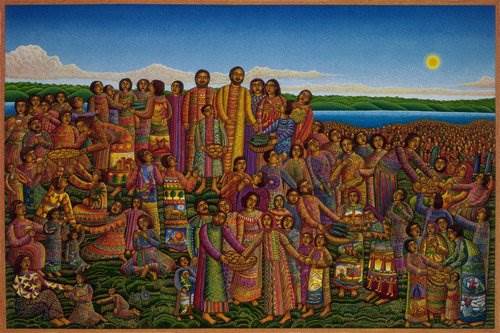 Dear Friends, Lent 2015 John #9
Dear Friends, Lent 2015 John #9
Jesus continues the dialogue with the religious leaders from yesterday’s reading. He points out that testimony to his identity comes from four sources: John the Baptist; the signs and miracles Jesus himself performs; the Father; and the Scriptures.
Finally Jesus claims that the unwillingness of the leaders to see his authority comes from their willful disbelief. And that willful disbelief comes from the lack of love in their hearts.
Blessings on your reading,
Pastor Sarah
John 5:31-47
“If I were to testify on my own behalf, my testimony would not be valid. 32 But someone else is also testifying about me, and I assure you that everything he says about me is true. In fact, you sent investigators to listen to John the Baptist, and his testimony about me was true. Of course, I have no need of human witnesses, but I say these things so you might be saved. John was like a burning and shining lamp, and you were excited for a while about his message. But I have a greater witness than John—my teachings and my miracles. The Father gave me these works to accomplish, and they prove that he sent me. And the Father who sent me has testified about me himself. You have never heard his voice or seen him face to face, and you do not have his message in your hearts, because you do not believe me—the one he sent to you.
“You search the Scriptures because you think they give you eternal life. But the Scriptures point to me! Yet you refuse to come to me to receive this life.
“Your approval means nothing to me, because I know you don’t have God’s love within you. For I have come to you in my Father’s name, and you have rejected me. Yet if others come in their own name, you gladly welcome them. No wonder you can’t believe! For you gladly honor each other, but you don’t care about the honor that comes from the one who alone is God.
“Yet it isn’t I who will accuse you before the Father. Moses will accuse you! Yes, Moses, in whom you put your hopes. If you really believed Moses, you would believe me, because he wrote about me. But since you don’t believe what he wrote, how will you believe what I say?”
Dear Friends, Lent 2015 John #8
The religious leaders were angry that Jesus healed people on the Sabbath day of rest. In his response to this charge, Jesus asserts that not only is he the Son of God, but he is the same essence as God, and therefore equal to God.
This is a difficult passage to read, and it is not in our Revised Common Lectionary of verses to be read in worship.
Blessings on your reading,
Pastor Sarah
John 5:16-30
So the Jewish leaders began harassing Jesus for breaking the Sabbath rules. But Jesus replied, “My Father is always working, and so am I.” So the Jewish leaders tried all the harder to find a way to kill him. For he not only broke the Sabbath, he called God his Father, thereby making himself equal with God.
So Jesus explained, “I tell you the truth, the Son can do nothing by himself. He does only what he sees the Father doing. Whatever the Father does, the Son also does. For the Father loves the Son and shows him everything he is doing. In fact, the Father will show him how to do even greater works than healing this man. Then you will truly be astonished. For just as the Father gives life to those he raises from the dead, so the Son gives life to anyone he wants. In addition, the Father judges no one. Instead, he has given the Son absolute authority to judge, so that everyone will honor the Son, just as they honor the Father. Anyone who does not honor the Son is certainly not honoring the Father who sent him.
“I tell you the truth, those who listen to my message and believe in God who sent me have eternal life. They will never be condemned for their sins, but they have already passed from death into life.
“And I assure you that the time is coming, indeed it’s here now, when the dead will hear my voice—the voice of the Son of God. And those who listen will live. The Father has life in himself, and he has granted that same life-giving power to his Son. And he has given him authority to judge everyone because he is the Son of Man. Don’t be so surprised! Indeed, the time is coming when all the dead in their graves will hear the voice of God’s Son, and they will rise again. Those who have done good will rise to experience eternal life, and those who have continued in evil will rise to experience judgment. I can do nothing on my own. I judge as God tells me. Therefore, my judgment is just, because I carry out the will of the one who sent me, not my own will.
Dear Friends, Lent 2015 John #7
There are some people who no matter what good news they receive will find something wrong with it. The religious leaders of Jesus’ day were just such kind of folks. When they see a man who has been lame for 38 years walking towards them, their reaction is to scold him for carrying his mat. Why are some so resistant to the good news Jesus brings that they can’t accept it? Why do transformations and healings in others, sometimes threaten their neighbors and friends?
In discussing the healing of the man sick for so long, I’ve heard some assume that he had not really wanted to get well. They argue that the man was just lying around, and that was why Jesus specifically asked him if he wanted to be healed. But that interpretation is very condescending to those who have been chronically ill for years. To have it implied that these people don’t want healing is hurtful.
We pray for healing and wholeness for ourselves and our friends because we know God wants all of us to experience abundant life. We continue to pray even as we realize that physical healing on our timetable may not be God’s will at the present time. With just a word Jesus healed the man lying by the pool. Yet scripture does not tell us if the crowd of people surrounding him were healed as well.
Blessings on your reading,
Pastor Sarah
John 4:43—5:15
At the end of the two days, Jesus went on to Galilee. He himself had said that a prophet is not honored in his own hometown. Yet the Galileans welcomed him, for they had been in Jerusalem at the Passover celebration and had seen everything he did there.
As he traveled through Galilee, he came to Cana, where he had turned the water into wine. There was a government official in nearby Capernaum whose son was very sick. When he heard that Jesus had come from Judea to Galilee, he went and begged Jesus to come to Capernaum to heal his son, who was about to die.
Jesus asked, “Will you never believe in me unless you see miraculous signs and wonders?”
The official pleaded, “Lord, please come now before my little boy dies.”
Then Jesus told him, “Go back home. Your son will live!” And the man believed what Jesus said and started home.
While the man was on his way, some of his servants met him with the news that his son was alive and well. He asked them when the boy had begun to get better, and they replied, “Yesterday afternoon at one o’clock his fever suddenly disappeared!” Then the father realized that that was the very time Jesus had told him, “Your son will live.” And he and his entire household believed in Jesus. This was the second miraculous sign Jesus did in Galilee after coming from Judea.
5 Afterward Jesus returned to Jerusalem for one of the Jewish holy days. Inside the city, near the Sheep Gate, was the pool of Bethesda, with five covered porches. Crowds of sick people—blind, lame, or paralyzed—lay on the porches. One of the men lying there had been sick for thirty-eight years. When Jesus saw him and knew he had been ill for a long time, he asked him, “Would you like to get well?”
“I can’t, sir,” the sick man said, “for I have no one to put me into the pool when the water bubbles up. Someone else always gets there ahead of me.”
Jesus told him, “Stand up, pick up your mat, and walk!”
Instantly, the man was healed! He rolled up his sleeping mat and began walking! But this miracle happened on the Sabbath, so the Jewish leaders objected. They said to the man who was cured, “You can’t work on the Sabbath! The law doesn’t allow you to carry that sleeping mat!”
But he replied, “The man who healed me told me, ‘Pick up your mat and walk.’”
“Who said such a thing as that?” they demanded.
The man didn’t know, for Jesus had disappeared into the crowd. But afterward Jesus found him in the Temple and told him, “Now you are well; so stop sinning, or something even worse may happen to you.” Then the man went and told the Jewish leaders that it was Jesus who had healed him.
5:3 Some manuscripts add an expanded conclusion to verse 3 and all of verse 4: waiting for a certain movement of the water, 4 for an angel of the Lord came from time to time and stirred up the water. And the first person to step in after the water was stirred was healed of whatever disease he had.
Dear Friends, Lent 2015 John #6
Today we read of the incredible conversation between Jesus and an unnamed Samaritan woman he met at a well. In this conversation, recorded only in John, Jesus makes powerful statements about a variety of spiritual truths.
“God is spirit, so those who worship him must worship in spirit and in truth,” Jesus responds in answer to a question about the correct place to worship.
God offers “living water,” Jesus promises. The living water I give, Jesus adds, “becomes a perpetual spring within [people], giving them eternal life.”
Jesus meets the Samaritan woman in bright sunshine and she sees and believes. Compare this conversation with his earlier meeting with Nicodemus in the dark of night, when Nicodemus is confused and twice asks, “What do you mean?”
Finally, notice what an exemplary evangelist this woman is. “Come and see,” she says, echoing the words of earlier disciples. And her simple invitation to her neighbors to come and see results in many coming to faith in Jesus.
Blessings on your reading,
Pastor Sarah
John 4:4-42
He had to go through Samaria on the way. Eventually he came to the Samaritan village of Sychar, near the field that Jacob gave to his son Joseph. Jacob’s well was there; and Jesus, tired from the long walk, sat wearily beside the well about noontime. Soon a Samaritan woman came to draw water, and Jesus said to her, “Please give me a drink.” He was alone at the time because his disciples had gone into the village to buy some food.
The woman was surprised, for Jews refuse to have anything to do with Samaritans. She said to Jesus, “You are a Jew, and I am a Samaritan woman. Why are you asking me for a drink?”
Jesus replied, “If you only knew the gift God has for you and who you are speaking to, you would ask me, and I would give you living water.”
“But sir, you don’t have a rope or a bucket,” she said, “and this well is very deep. Where would you get this living water? And besides, do you think you’re greater than our ancestor Jacob, who gave us this well? How can you offer better water than he and his sons and his animals enjoyed?”
Jesus replied, “Anyone who drinks this water will soon become thirsty again. 14 But those who drink the water I give will never be thirsty again. It becomes a fresh, bubbling spring within them, giving them eternal life.”
“Please, sir,” the woman said, “gives me this water! Then I’ll never be thirsty again, and I won’t have to come here to get water.”
“Go and get your husband,” Jesus told her.
“I don’t have a husband,” the woman replied.
Jesus said, “You’re right! You don’t have a husband— for you have had five husbands, and you aren’t even married to the man you’re living with now. You certainly spoke the truth!”
“Sir,” the woman said, “you must be a prophet. So tell me, why is it that you Jews insist that Jerusalem is the only place of worship, while we Samaritans claim it is here at Mount Gerizim, where our ancestors worshiped?”
Jesus replied, “Believe me, dear woman, the time is coming when it will no longer matter whether you worship the Father on this mountain or in Jerusalem. You Samaritans know very little about the one you worship, while we Jews know all about him, for salvation comes through the Jews. But the time is coming—indeed it’s here now—when true worshipers will worship the Father in spirit and in truth. The Father is looking for those who will worship him that way. For God is Spirit, so those who worship him must worship in spirit and in truth.”
The woman said, “I know the Messiah is coming—the one who is called Christ. When he comes, he will explain everything to us.”
Then Jesus told her, “I am the Messiah!”
Just then his disciples came back. They were shocked to find him talking to a woman, but none of them had the nerve to ask, “What do you want with her?” or “Why are you talking to her?” The woman left her water jar beside the well and ran back to the village, telling everyone, “Come and see a man who told me everything I ever did! Could he possibly be the Messiah?” So the people came streaming from the village to see him.
Meanwhile, the disciples were urging Jesus, “Rabbi, eat something.”
But Jesus replied, “I have a kind of food you know nothing about.”
“Did someone bring him food while we were gone?” the disciples asked each other.
Then Jesus explained: “My nourishment comes from doing the will of God, who sent me, and from finishing his work. You know the saying, ‘Four months between planting and harvest.’ But I say, wake up and look around. The fields are already ripe for harvest. The harvesters are paid good wages, and the fruit they harvest is people brought to eternal life. What joy awaits both the planter and the harvester alike! You know the saying, ‘One plants and another harvests.’ And it’s true. I sent you to harvest where you didn’t plant; others had already done the work, and now you will get to gather the harvest.”
Many Samaritans from the village believed in Jesus because the woman had said, “He told me everything I ever did!” When they came out to see him, they begged him to stay in their village. So he stayed for two days, long enough for many more to hear his message and believe. Then they said to the woman, “Now we believe, not just because of what you told us, but because we have heard him ourselves. Now we know that he is indeed the Savior of the world.”
Dear Friends, Lent 2015 John #5
Today we read a more detailed testimony by John the Baptist about the power and glory of Jesus, the Messiah. And we are told of the rising popularity of Jesus.
Popularity, measured by the size of the crowd, doesn’t seem to concern either John or Jesus. Remember the end of chapter 2:23:
“Because of the miraculous signs he did in Jerusalem at the Passover celebration, many people were convinced that he was indeed the Messiah. But Jesus didn’t trust them, because he knew what people were really like. No one needed to tell him about human nature.”
In today’s reading John, in answer to his disciples’ complaint that “everyone is going over there (to hear Jesus) instead of coming here to us,” notes “how few people believe what he (Jesus) tells them.”
The size of the crowd, the number of people in worship, approval ratings—Jesus looks beyond these superficial rankings and instead looks for transformed hearts.
Blessings on your reading,
Pastor Sarah
John 3:22—4:3
Then Jesus and his disciples left Jerusalem and went into the Judean countryside. Jesus spent some time with them there, baptizing people.
At this time John the Baptist was baptizing at Aenon, near Salim, because there was plenty of water there; and people kept coming to him for baptism. (This was before John was thrown into prison.) A debate broke out between John’s disciples and a certain Jew over ceremonial cleansing. So John’s disciples came to him and said, “Rabbi, the man you met on the other side of the Jordan River, the one you identified as the Messiah, is also baptizing people. And everybody is going to him instead of coming to us.”
John replied, “No one can receive anything unless God gives it from heaven. You yourselves know how plainly I told you, ‘I am not the Messiah. I am only here to prepare the way for him.’ It is the bridegroom who marries the bride, and the best man is simply glad to stand with him and hear his vows. Therefore, I am filled with joy at his success. He must become greater and greater, and I must become less and less.
“He has come from above and is greater than anyone else. We are of the earth, and we speak of earthly things, but he has come from heaven and is greater than anyone else. He testifies about what he has seen and heard, but how few believe what he tells them! Anyone who accepts his testimony can affirm that God is true. For he is sent by God. He speaks God’s words, for God gives him the Spirit without limit. The Father loves his Son and has put everything into his hands. And anyone who believes in God’s Son has eternal life. Anyone who doesn’t obey the Son will never experience eternal life but remains under God’s angry judgment.”
Jesus knew the Pharisees had heard that he was baptizing and making more disciples than John (though Jesus himself didn’t baptize them—his disciples did). So he left Judea and returned to Galilee.
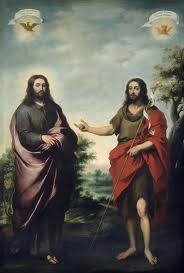 Dear Friends, Lent 2015 John #4
Dear Friends, Lent 2015 John #4
Today as you read John 3:16-17 notice that it is Jesus who is speaking. John could have chosen to record Jesus speaking in the first person. Then that favorite verse would read:
“God sent me, his only son, into this world so that any of you who believe in me won’t die but will have eternal life. I didn’t come to judge the world. I came to save the world.”
Although Jesus was/is concerned about people’s physical needs, in his conversation with Nicodemus he makes it clear that our spiritual lives are of upmost importance to him. Throughout John’s gospel the Holy Spirit plays an active role. Jesus compares the Spirit to the wind as it flows freely, touching and blessing people.
There is no Pentecost in this gospel. In his first post resurrection appearance, Jesus breathes on the disciples and gives them the Holy Spirit. (John 20:22) And he begins teaching about the Spirit right from the beginning of his ministry.
Blessings on your Lenten reading,
Pastor Sarah
John 2:23—3:21
Because of the miraculous signs Jesus did in Jerusalem at the Passover celebration, many began to trust in him. But Jesus didn’t trust them, because he knew all about people. No one needed to tell him about human nature, for he knew what was in each person’s heart.
There was a man named Nicodemus, a Jewish religious leader who was a Pharisee. After dark one evening, he came to speak with Jesus. “Rabbi,” he said, “we all know that God has sent you to teach us. Your miraculous signs are evidence that God is with you.”
Jesus replied, “I tell you the truth, unless you are born again, you cannot see the Kingdom of God.”
“What do you mean?” exclaimed Nicodemus. “How can an old man go back into his mother’s womb and be born again?”
Jesus replied, “I assure you, no one can enter the Kingdom of God without being born of water and the Spirit. Humans can reproduce only human life, but the Holy Spirit gives birth to spiritual life. So don’t be surprised when I say, ‘You must be born again.’ The wind blows wherever it wants. Just as you can hear the wind but can’t tell where it comes from or where it is going, so you can’t explain how people are born of the Spirit.”
“How are these things possible?” Nicodemus asked.
Jesus replied, “You are a respected Jewish teacher, and yet you don’t understand these things? I assure you, we tell you what we know and have seen, and yet you won’t believe our testimony. But if you don’t believe me when I tell you about earthly things, how can you possibly believe if I tell you about heavenly things? No one has ever gone to heaven and returned. But the Son of Man has come down from heaven. And as Moses lifted up the bronze snake on a pole in the wilderness, so the Son of Man must be lifted up, so that everyone who believes in him will have eternal life.
16 “For this is how God loved the world: He gave his one and only Son, so that everyone who believes in him will not perish but have eternal life. God sent his Son into the world not to judge the world, but to save the world through him.
“There is no judgment against anyone who believes in him. But anyone who does not believe in him has already been judged for not believing in God’s one and only Son. And the judgment is based on this fact: God’s light came into the world, but people loved the darkness more than the light, for their actions were evil. All who do evil hate the light and refuse to go near it for fear their sins will be exposed. But those who do what is right come to the light so others can see that they are doing what God wants.”
Dear Friends, Lent 2015 John #3
In John the miraculous actions of Jesus are never called miracles, but are referred to as “signs.” I think this helps clarify the true purpose of these events—they occurred to prove that Jesus had the power belonging to the Son of God, and were designed to build faith and trust.
Turning water into wine at the wedding in Cana is the first sign John records and is not in the other gospels. This scene is one of only two times that Jesus’ mother appears in John. The second time is at the foot of Jesus’ cross. Notice John doesn’t use her given name, Mary, but only refers to her by her relationship to Jesus.
One of the most significant differences between this gospel and the others is the time of Jesus’ anger in the temple. John places it at the beginning of Jesus’ public ministry, while the others place it during Holy Week as one of the final acts that anger the authorities. Placed early in the gospel, the sign at the wedding and the scene at the temple introduce the power and scope of the transformations Jesus will bring about.
Blessings on your reading,
Pastor Sarah
John 2:1-22
The next day there was a wedding celebration in the village of Cana in Galilee. Jesus’ mother was there, and Jesus and his disciples were also invited to the celebration. The wine supply ran out during the festivities, so Jesus’ mother told him, “They have no more wine.”
“Dear woman, that’s not our problem,” Jesus replied. “My time has not yet come.”
But his mother told the servants, “Do whatever he tells you.”
Standing nearby were six stone water jars, used for Jewish ceremonial washing. Each could hold twenty to thirty gallons. Jesus told the servants, “Fill the jars with water.” When the jars had been filled, he said, “Now dip some out, and take it to the master of ceremonies.” So the servants followed his instructions.
When the master of ceremonies tasted the water that was now wine, not knowing where it had come from (though, of course, the servants knew), he called the bridegroom over. “A host always serves the best wine first,” he said. “Then, when everyone has had a lot to drink, he brings out the less expensive wine. But you have kept the best until now!”
This miraculous sign at Cana in Galilee was the first time Jesus revealed his glory. And his disciples believed in him.
After the wedding he went to Capernaum for a few days with his mother, his brothers, and his disciples.
It was nearly time for the Jewish Passover celebration, so Jesus went to Jerusalem. In the Temple area he saw merchants selling cattle, sheep, and doves for sacrifices; he also saw dealers at tables exchanging foreign money. Jesus made a whip from some ropes and chased them all out of the Temple. He drove out the sheep and cattle, scattered the money changers’ coins over the floor, and turned over their tables. Then, going over to the people who sold doves, he told them, “Get these things out of here. Stop turning my Father’s house into a marketplace!”
Then his disciples remembered this prophecy from the Scriptures: “Passion for God’s house will consume me.” (Psalm 69:9)
But the Jewish leaders demanded, “What are you doing? If God gave you authority to do this, show us a miraculous sign to prove it.”
“All right,” Jesus replied. “Destroy this temple, and in three days I will raise it up.”
“What!” they exclaimed. “It has taken forty-six years to build this Temple, and you can rebuild it in three days?” But when Jesus said “this temple,” he meant his own body. After he was raised from the dead, his disciples remembered he had said this, and they believed both the Scriptures and what Jesus had said.
Dear Friends, Lent 2015 John #1
If you haven’t yet decided on a Lenten discipline for this year, perhaps you’d like to read the Gospel according to John. I didn’t try to stick to a timetable for our reading of Luke; it just took as long as it took. But I think it might be valuable to read the entire gospel of John during Lent. If we read 5 days a week, we can finish during Holy Week.
John is quite distinct from the other 3 synoptic gospels. It has stories and long monologues of Jesus that are not found anywhere else, and it doesn’t cover some of the stories that figure prominently in them. It is heavy with symbolism, irony and paradox.
If you find that we are going too quickly through John please let me know. If you feel that way, undoubtedly there are others who do as well.
If you have feedback on our journey through Luke I’d love to hear from you. A reminder: anytime you want to comment or question, just hit reply and we can start a conversation.
John was the last of the gospels to be written, probably in the 80’s or 90’s. It appears to be directed more to strengthening the faith of believers than to converting unbelievers. We begin with the prologue of John.
Blessings on your reading, and on your Lenten disciplines,
Pastor Sarah
John 1:1-18
In the beginning the Word already existed.
The Word was with God,
and the Word was God.
He existed in the beginning with God.
God created everything through him,
and nothing was created except through him.
The Word gave life to everything that was created,
and his life brought light to everyone.
The light shines in the darkness,
and the darkness can never extinguish it.
God sent a man, John the Baptist, to tell about the light so that everyone might believe because of his testimony. John himself was not the light; he was simply a witness to tell about the light. The one who is the true light, who gives light to everyone, was coming into the world.
He came into the very world he created, but the world didn’t recognize him. He came to his own people, and even they rejected him. But to all who believed him and accepted him, he gave the right to become children of God. They are reborn—not with a physical birth resulting from human passion or plan, but a birth that comes from God.
So the Word became human and made his home among us. He was full of unfailing love and faithfulness. And we have seen his glory, the glory of the Father’s one and only Son.
John testified about him when he shouted to the crowds, “This is the one I was talking about when I said, ‘Someone is coming after me who is far greater than I am, for he existed long before me.’”
From his abundance we have all received one gracious blessing after another. For the law was given through Moses, but God’s unfailing love and faithfulness came through Jesus Christ. No one has ever seen God. But the unique One, who is himself God, is near to the Father’s heart. He has revealed God to us.
Dear Friends, St. Luke’s reading Psalm 51 Ash Wed. 2015
Psalm 51 is the designated psalm for Ash Wednesday, which we will read as part of our services at noon and 7 pm today. The background is recorded in 2 Samuel 11-12. King David committed adultery with Bathsheba, and then had her husband killed in battle. When the prophet Nathan confronted David, he responded, “I have sinned against the Lord.” Psalm 51 is the rest of his confession.
It works well as a confession for us too.
Blessings as we begin our journey through Lent,
Pastor Sarah
Psalm 51
1 Have mercy on me, O God,
because of your unfailing love.
Because of your great compassion,
blot out the stain of my sins.
2 Wash me clean from my guilt. Purify me from my sin.
For I recognize my rebellion; it haunts me day and night.
Against you, and you alone, have I sinned; I have done what is evil in your sight.
You will be proved right in what you say, and your judgment against me is just.
5 For I was born a sinner—yes, from the moment my mother conceived me.
But you desire honesty from the heart, teaching me wisdom even there.
7 Purify me from my sins, and I will be clean;
wash me, and I will be whiter than snow.
8 Oh, give me back my joy again;
you have broken me—
now let me rejoice.
9 Don’t keep looking at my sins.
Remove the stain of my guilt.
Create in me a clean heart, O God.
Renew a loyal spirit within me.
Do not banish me from your presence,
and don’t take your Holy Spirit from me.
Restore to me the joy of your salvation,
and make me willing to obey you.
Then I will teach your ways to rebels,
and they will return to you.
14 Forgive me for shedding blood, O God who saves;
then I will joyfully sing of your forgiveness.
15 Unseal my lips, O Lord,
that my mouth may praise you.
16 You do not desire a sacrifice, or I would offer one.
You do not want a burnt offering.
17 The sacrifice you desire is a broken spirit.
You will not reject a broken and repentant heart, O God.
18 Look with favor on Zion and help her;
rebuild the walls of Jerusalem.
19 Then you will be pleased with sacrifices offered in the right spirit—
with burnt offerings and whole burnt offerings.
Then bulls will again be sacrificed on your altar..
Dear Friends, Luke #89—final reading Tues. Feb. 17, 2015
Deciding how to end a piece of writing can be as difficult, and as important, as deciding how to begin. Luke ends his gospel rather quickly with only a few verses. But remember Luke also wrote the Acts of the Apostles, which he calls book 2. In Acts chapter 1 he writes a longer version of the Ascension and changes the location from Bethany to Jerusalem. I will print the Acts passage for you below the final verses from Luke.
Notice that in Acts the angels who speak following the Ascension have much the same message as did the angels at the tomb: “Why are you standing here staring into heaven? Jesus has been taken from you into heaven, but someday he will return from heaven in the same way you saw him go!”
In Luke’s story of Jesus’ birth the angels told the shepherds, “I am bringing you good news of great joy for all the people.” (1:10) Following Jesus’ ascension, Luke writes that the disciples “returned to Jerusalem filled with great joy.” It begins and ends with great joy.
May that be true for us as well,
Pastor Sarah
Luke 24:50-53
Then Jesus led them to Bethany, and lifting his hands to heaven, he blessed them. While he was blessing them, he left them and was taken up to heaven. So they worshiped him and then returned to Jerusalem filled with great joy. And they spent all of their time in the Temple, praising God.
Acts 1:8-11
Jesus replied, “You will receive power when the Holy Spirit comes upon you. And you will be my witnesses, telling people about me everywhere—in Jerusalem, throughout Judea, in Samaria, and to the ends of the earth.”
After saying this, he was taken up into a cloud while they were watching, and they could no longer see him. As they strained to see him rising into heaven, two white-robed men suddenly stood among them.
“Men of Galilee,” they said, “why are you standing here staring into heaven? Jesus has been taken from you into heaven, but someday he will return from heaven in the same way you saw him go!”
Dear Friends, Luke # 88 Monday, Feb. 16, 2015
Jesus’ resurrected body is unlike any body we have seen. He appears and disappears in an instant, yet he also makes a point of showing the disciples that he is not a ghost or spirit.
We don’t know what our resurrected bodies will be like. This verse came to mind as I was reflecting: “For if we have been united with him in a death like his, we will certainly be united with him in a resurrection like his.” (Romans 6:5)
As he did with the disciples on the walk to Emmaus, for these disciples as well Jesus “opened their minds to understand the Scriptures.”
May God continue to bless us as our minds are opened to understand the Scriptures too.
Pastor Sarah
Luke 24:35-49
Then the two from Emmaus told their story of how Jesus had appeared to them as they were walking along the road, and how they had recognized him as he was breaking the bread. And just as they were telling about it, Jesus himself was suddenly standing there among them. “Peace be with you,” he said. But the whole group was startled and frightened, thinking they were seeing a ghost!
“Why are you frightened?” he asked. “Why are your hearts filled with doubt? Look at my hands. Look at my feet. You can see that it’s really me. Touch me and make sure that I am not a ghost, because ghosts don’t have bodies, as you see that I do.” As he spoke, he showed them his hands and his feet.
Still they stood there in disbelief, filled with joy and wonder. Then he asked them, “Do you have anything here to eat?” They gave him a piece of broiled fish, and he ate it as they watched.
Then he said, “When I was with you before, I told you that everything written about me in the Law of Moses and the prophets and in the Psalms must be fulfilled.” Then he opened their minds to understand the Scriptures. And he said, “Yes, it was written long ago that the Messiah would suffer and die and rise from the dead on the third day. It was also written that this message would be proclaimed in the authority of his name to all the nations, beginning in Jerusalem: ‘There is forgiveness of sins for all who repent.’ You are witnesses of all these things.
“And now I will send the Holy Spirit, just as my Father promised. But stay here in the city until the Holy Spirit comes and fills you with power from heaven.”
Dear Friends, Luke #87 Friday, Sept. 13, 2015
The women who came to the tomb were looking for Jesus in the wrong place. The two men traveling on the road to Emmaus weren’t even looking for Jesus at all. But they were open and questioning, and they became the first to find the post-resurrection Jesus Christ.
They found him when they stopped and had a meal with Jesus and he broke bread and gave it to them. That is the same place we can find him too.
Blessings on your reading,
Pastor Sarah
Luke 24:13-34
That same day two of Jesus’ followers were walking to the village of Emmaus, seven miles from Jerusalem. As they walked along they were talking about everything that had happened. As they talked and discussed these things, Jesus himself suddenly came and began walking with them. But God kept them from recognizing him.
He asked them, “What are you discussing so intently as you walk along?”
They stopped short, sadness written across their faces. Then one of them, Cleopas, replied, “You must be the only person in Jerusalem who hasn’t heard about all the things that have happened there the last few days.”
“What things?” Jesus asked.
“The things that happened to Jesus, the man from Nazareth,” they said. “He was a prophet who did powerful miracles, and he was a mighty teacher in the eyes of God and all the people. But our leading priests and other religious leaders handed him over to be condemned to death, and they crucified him. We had hoped he was the Messiah who had come to rescue Israel. This all happened three days ago.
“Then some women from our group of his followers were at his tomb early this morning, and they came back with an amazing report. They said his body was missing, and they had seen angels who told them Jesus is alive! Some of our men ran out to see, and sure enough, his body was gone, just as the women had said.”
Then Jesus said to them, “You foolish people! You find it so hard to believe all that the prophets wrote in the Scriptures. Wasn’t it clearly predicted that the Messiah would have to suffer all these things before entering his glory?” Then Jesus took them through the writings of Moses and all the prophets, explaining from all the Scriptures the things concerning himself.
By this time they were nearing Emmaus and the end of their journey. Jesus acted as if he were going on, but they begged him, “Stay the night with us, since it is getting late.” So he went home with them. As they sat down to eat, he took the bread and blessed it. Then he broke it and gave it to them. Suddenly, their eyes were opened, and they recognized him. And at that moment he disappeared!
They said to each other, “Didn’t our hearts burn within us as he talked with us on the road and explained the Scriptures to us?” And within the hour they were on their way back to Jerusalem. There they found the eleven disciples and the others who had gathered with them, who said, “The Lord has really risen! He appeared to Peter.”
Dear Friends, Luke #86 Thursday, Feb. 12, 2015
There were no trumpets or drum rolls. There was no pageantry of any kind. There weren’t even any human witnesses to see Jesus emerge from the tomb.
When the women arrived there was no one there at all. The stone had been moved from its position blocking the entrance and the tomb was empty.
Two angels appeared and spoke to the women, questioning their intent—why did they think they could find a live person in a tomb—and telling them to remember, to remember everything they had been taught.
If we have trouble finding Jesus perhaps we are looking in the wrong places. And perhaps by remembering his story we will know where to find him.
Blessings on your reading,
Pastor Sarah
Luke 24:1-12
But very early on Sunday morning the women went to the tomb, taking the spices they had prepared. They found that the stone had been rolled away from the entrance. So they went in, but they didn’t find the body of the Lord Jesus. As they stood there puzzled, two men suddenly appeared to them, clothed in dazzling robes.
The women were terrified and bowed with their faces to the ground. Then the men asked, “Why are you looking among the dead for someone who is alive? He isn’t here! He is risen from the dead! Remember what he told you back in Galilee, that the Son of Man must be betrayed into the hands of sinful men and be crucified, and that he would rise again on the third day.”
Then they remembered that he had said this. So they rushed back from the tomb to tell his eleven disciples—and everyone else—what had happened. It was Mary Magdalene, Joanna, Mary the mother of James, and several other women who told the apostles what had happened. But the story sounded like nonsense to the men, so they didn’t believe it. However, Peter jumped up and ran to the tomb to look. Stooping, he peered in and saw the empty linen wrappings; then he went home again, wondering what had happened.
Dear Friends, Luke #85 Wed. Feb. 11, 2015
Jewish religious law dictated what was done to Jesus body after he died. It was extremely important that a body, even of a person executed for a crime, be buried before sundown on the day of death. Although there is evidence that during the Jewish rebellion in 66-70 CE, crucified bodies were left to hang on the crosses for days, Jesus’ body was most likely buried. In peacetime the Roman officials would not have wanted to offend Jewish religious beliefs, especially at the beginning of Passover. Most Jewish criminals would have been buried in common graves, but it is not unusual that Pilate would have given Joseph the body, especially if he had been bribed to do so. Having Jesus placed in an identifiable grave made it possible for guards to be posted (as other gospels describe), as well as for the women followers to return to it the day after Sabbath.
Blessings on your reading,
Pastor Sarah
Luke 23:47-56
When the Roman officer overseeing the execution saw what had happened, he worshiped God and said, “Surely this man was innocent.” And when all the crowd that came to see the crucifixion saw what had happened, they went home in deep sorrow. But Jesus’ friends, including the women who had followed him from Galilee, stood at a distance watching.
Now there was a good and righteous man named Joseph. He was a member of the Jewish high council, but he had not agreed with the decision and actions of the other religious leaders. He was from the town of Arimathea in Judea, and he was waiting for the Kingdom of God to come. He went to Pilate and asked for Jesus’ body. Then he took the body down from the cross and wrapped it in a long sheet of linen cloth and laid it in a new tomb that had been carved out of rock. This was done on late Friday afternoon, the day of preparation, as the Sabbath was about to begin.
As his body was taken away, the women from Galilee followed and saw the tomb where his body was placed. Then they went home and prepared spices and ointments to anoint his body. But by the time they were finished the Sabbath had begun, so they rested as required by the law.
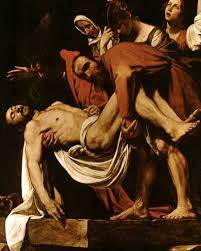 Dear Friends, Luke #84 Tuesday, Feb. 10, 2015
Dear Friends, Luke #84 Tuesday, Feb. 10, 2015
The Apostle’s Creed uses only one sentence to describe the events of Good Friday: “He was crucified, died and was buried.” Our reading today describes the horror of the crucifixion and ends with Jesus’ final breath.
When all 4 gospels are combined, Jesus is recorded as speaking seven phrases from the cross. Luke contains only 3 of them. I doubt whether a man so tortured before the long walk to the place of crucifixion could have uttered the message to the crowd following him that Luke includes. Other gospels have Jesus warning people in very similar words but much earlier.
The New Living Translation names the place of his crucifixion as “The Skull.” In Aramaic (the language Jesus spoke) the name is Golgotha; in Greek it is Kranion; and in Latin it is Calvarius, from which we get the word Calvary. In all three languages the place name means skull. Supposedly the hill looks like the shape of a human skull. Later legend says that the skull of Adam was buried at the same spot as the cross upon which Jesus died, and that the spot was originally the Garden of Eden. The legend is only that, a legend. Nothing could add, or detract, from the sacredness of the spot where Jesus died.
Blessings on your reading,
Pastor Sarah.
Luke 23:26-46
As they led Jesus away, a man named Simon, who was from Cyrene, happened to be coming in from the countryside. The soldiers seized him and put the cross on him and made him carry it behind Jesus. A large crowd trailed behind, including many grief-stricken women. But Jesus turned and said to them, “Daughters of Jerusalem, don’t weep for me, but weep for yourselves and for your children. For the days are coming when they will say, ‘Fortunate indeed are the women who are childless, the wombs that have not borne a child and the breasts that have never nursed.’ People will beg the mountains, ‘Fall on us,’ and plead with the hills, ‘Bury us.’ For if these things are done when the tree is green, what will happen when it is dry?”
Two others, both criminals, were led out to be executed with him. When they came to a place called The Skull, they nailed him to the cross. And the criminals were also crucified—one on his right and one on his left.
Jesus said, “Father, forgive them, for they don’t know what they are doing.” And the soldiers gambled for his clothes by throwing dice. (Ps.22:18)
The crowd watched and the leaders scoffed. “He saved others,” they said, “let him save himself if he is really God’s Messiah, the Chosen One.” The soldiers mocked him, too, by offering him a drink of sour wine. They called out to him, “If you are the King of the Jews, save yourself!” A sign was fastened above him with these words: “This is the King of the Jews.”
One of the criminals hanging beside him scoffed, “So you’re the Messiah, are you? Prove it by saving yourself—and us, too, while you’re at it!”
But the other criminal protested, “Don’t you fear God even when you have been sentenced to die? We deserve to die for our crimes, but this man hasn’t done anything wrong.” Then he said, “Jesus, remember me when you come into your Kingdom.”
By this time it was noon, and darkness fell across the whole land until three o’clock. The light from the sun was gone. And suddenly, the thick veil hanging in the Temple was torn apart. Then Jesus shouted, “Father, I entrust my spirit into your hands!” And with those words he breathed his last.
Dear Friends, Luke #83 Friday, Feb. 6, 2015
Today we read Luke’s account of the farce that was Jesus’ trial before the Roman governor Pilate. The accusations brought by the Jewish council charged Jesus advocated tax evasion, claimed he was a king, incited riots and attempted to lead a revolt.
Three times Pilate renders a verdict of not guilty: “I find nothing wrong with this man.” “I find him innocent.” “I have found no reason to sentence him to death.”
But Pilate was a coward and faced with a crowd hungry for Jesus’ death he sentenced him to death.
Blessings on your reading,
Pastor Sarah
Luke 23:1-25
Then the entire council took Jesus to Pilate, the Roman governor. They began to state their case: “This man has been leading our people astray by telling them not to pay their taxes to the Roman government and by claiming he is the Messiah, a king.”
So Pilate asked him, “Are you the king of the Jews?”
Jesus replied, “You have said it.”
Pilate turned to the leading priests and to the crowd and said, “I find nothing wrong with this man!”
Then they became insistent. “But he is causing riots by his teaching wherever he goes—all over Judea, from Galilee to Jerusalem!”
“Oh, is he a Galilean?” Pilate asked. When they said that he was, Pilate sent him to Herod Antipas, because Galilee was under Herod’s jurisdiction, and Herod happened to be in Jerusalem at the time.
Herod was delighted at the opportunity to see Jesus, because he had heard about him and had been hoping for a long time to see him perform a miracle. He asked Jesus question after question, but Jesus refused to answer. Meanwhile, the leading priests and the teachers of religious law stood there shouting their accusations. Then Herod and his soldiers began mocking and ridiculing Jesus. Finally, they put a royal robe on him and sent him back to Pilate. (Herod and Pilate, who had been enemies before, became friends that day.)
Then Pilate called together the leading priests and other religious leaders, along with the people, and he announced his verdict. “You brought this man to me, accusing him of leading a revolt. I have examined him thoroughly on this point in your presence and find him innocent. Herod came to the same conclusion and sent him back to us. Nothing this man has done calls for the death penalty. So I will have him flogged, and then I will release him.” [For it was necessary for him to release one prisoner during Passover.] (not all manuscripts have this verse)
Then a mighty roar rose from the crowd, and with one voice they shouted, “Kill him, and release Barabbas to us!” (Barabbas was in prison for taking part in an insurrection in Jerusalem against the government, and for murder.) Pilate argued with them, because he wanted to release Jesus. But they kept shouting, “Crucify him! Crucify him!”
For the third time he demanded, “Why? What crime has he committed? I have found no reason to sentence him to death. So I will have him flogged, and then I will release him.”
But the mob shouted louder and louder, demanding that Jesus be crucified, and their voices prevailed. So Pilate sentenced Jesus to die as they demanded. As they had requested, he released Barabbas, the man in prison for insurrection and murder. But he turned Jesus over to them to do as they wished.
Dear Friends, Luke #82 Thursday, Feb. 5, 2015
The torture of Jesus began when the temple guards brought him to the high priest’s home. Jesus had just experienced having two of his twelve closest friends, Judas and Peter, betray him.
The high priest was the president of the Sanhedrin, the ruling religious council in Judea. It was composed of 70 men who were chief priests, scribes and elders. They could not execute convicted criminals, so after they ruled that Jesus was guilty of blasphemy they took him to the Roman governor, Pontius Pilate.
Blessings on your reading,
Pastor Sarah
Luke 22:55-71
So they arrested him and led him to the high priest’s home. And Peter followed at a distance. The guards lit a fire in the middle of the courtyard and sat around it, and Peter joined them there. A servant girl noticed him in the firelight and began staring at him. Finally she said, “This man was one of Jesus’ followers!”
But Peter denied it. “Woman,” he said, “I don’t even know him!”
After a while someone else looked at him and said, “You must be one of them!”
“No, man, I’m not!” Peter retorted.
About an hour later someone else insisted, “This must be one of them, because he is a Galilean, too.”
But Peter said, “Man, I don’t know what you are talking about.” And immediately, while he was still speaking, the rooster crowed.
At that moment the Lord turned and looked at Peter. Suddenly, the Lord’s words flashed through Peter’s mind: “Before the rooster crows tomorrow morning, you will deny three times that you even know me.” And Peter left the courtyard, weeping bitterly.
The guards in charge of Jesus began mocking and beating him. They blindfolded him and said, “Prophesy to us! Who hit you that time?” And they hurled all sorts of terrible insults at him.
At daybreak all the elders of the people assembled, including the leading priests and the teachers of religious law. Jesus was led before this high council (the Sanhedrin), and they said, “Tell us, are you the Messiah?”
But he replied, “If I tell you, you won’t believe me. And if I ask you a question, you won’t answer. But from now on the Son of Man will be seated in the place of power at God’s right hand.” ( Psalm 110:1 )
They all shouted, “So, are you claiming to be the Son of God?”
And he replied, “You say that I am.”
“Why do we need other witnesses?” they said. “We ourselves heard him say it.”
Dear Friends, Luke #81 Wednesday, Feb. 4, 2015
Today’s reading continues the discussion at the table where Jesus and the 12 apostles had eaten the last supper. At first reading Jesus’ order to his disciples to buy a sword seems out of character. I was puzzled until I found this explanation, among other theories, of why Jesus would ask them to buy and carry swords. It was written by Jacques Ellul, a 20th century French theologian, who is one of many who don’t think that this passage overturns all the other things Jesus said against violence He writes,
“The further comment of Jesus explains in part the surprising statement, for he says: “It is necessary that the prophecy be fulfilled according to which I would be put in the ranks of criminals” (Luke 22:36-37). The idea of fighting with just two swords is ridiculous. The swords are enough, however, to justify the accusation that Jesus is the head of a band of brigands. We have to note here that Jesus is consciously fulfilling prophecy. If he were not the saying would make no sense.” from Anarchy and Christianity
Indeed, at the moment when Jesus is arrested and a disciple cuts off the ear of a soldier, Jesus tells them to stop resisting.
Blessings on your reading,
Pastor Sarah
Luke 22:35-53
Then Jesus asked them, “When I sent you out to preach the Good News and you did not have money, a traveler’s bag, or an extra pair of sandals, did you need anything?”
“No,” they replied.
“But now,” he said, “take your money and a traveler’s bag. And if you don’t have a sword, sell your cloak and buy one! For the time has come for this prophecy about me to be fulfilled: ‘He was counted among the rebels.’ ( Isaiah 53:12 ) Yes, everything written about me by the prophets will come true.”
“Look, Lord,” they replied, “we have two swords among us.”
“That’s enough,” he said.
Then, accompanied by the disciples, Jesus left the upstairs room and went as usual to the Mount of Olives. There he told them, “Pray that you will not give in to temptation.”
He walked away, about a stone’s throw, and knelt down and prayed, “Father, if you are willing, please take this cup of suffering away from me. Yet I want your will to be done, not mine.” Then an angel from heaven appeared and strengthened him. He prayed more fervently, and he was in such agony of spirit that his sweat fell to the ground like great drops of blood.
At last he stood up again and returned to the disciples, only to find them asleep, exhausted from grief. “Why are you sleeping?” he asked them. “Get up and pray, so that you will not give in to temptation.”
But even as Jesus said this, a crowd approached, led by Judas, one of the twelve disciples. Judas walked over to Jesus to greet him with a kiss. But Jesus said, “Judas, would you betray the Son of Man with a kiss?”
When the other disciples saw what was about to happen, they exclaimed, “Lord, should we fight? We brought the swords!” And one of them struck at the high priest’s slave, slashing off his right ear.
But Jesus said, “No more of this.” And he touched the man’s ear and healed him.
Then Jesus spoke to the leading priests, the captains of the Temple guard, and the elders who had come for him. “Am I some dangerous revolutionary,” he asked, “that you come with swords and clubs to arrest me? Why didn’t you arrest me in the Temple? I was there every day. But this is your moment, the time when the power of darkness reigns.”
Dear Friends, Luke #80 Tues. Feb. 3, 2015
The previous reading ended with the disciples asking each other if they would ever betray Jesus. The conversation then evolves to a discussion of who is the greatest among them.
Jesus enters the discussion to explain that in God’s kingdom the standard for greatness will be different than it is in the world. “Among you it will be different.” What a bold, straight forward admonition to his disciples and to us. We are to be different than those who do not believe. We, as Christians, have different ways of measuring success and power. We are called to be and to act in a different way.
I wish I had the time to investigate and then discuss with you the meaning of Jesus statement: “Satan has asked to sift each of you like wheat.” Satan appeared earlier in this chapter, in verse 3: “Then Satan entered into Judas . . .” Jesus’ battle with Satan has been ongoing since they met in the wilderness immediately after his baptism. Apparently Jesus did not have the power to stop Satan from interfering with the disciples. He prays for Simon to have the strength to resist. Does he continue to pray that we too have the strength to resist?
Blessings on your reading and your pondering,
Pastor Sarah
Luke 22:24-34
Then they began to argue among themselves about who would be the greatest among them. Jesus told them, “In this world the kings and great men lord it over their people, yet they are called ‘friends of the people.’ But among you it will be different. Those who are the greatest among you should take the lowest rank, and the leader should be like a servant. Who is more important, the one who sits at the table or the one who serves? The one who sits at the table, of course. But not here! For I am among you as one who serves.
“You have stayed with me in my time of trial. And just as my Father has granted me a Kingdom, I now grant you the right to eat and drink at my table in my Kingdom. And you will sit on thrones, judging the twelve tribes of Israel.
“Simon, Simon, Satan has asked to sift each of you like wheat. But I have pleaded in prayer for you, Simon, that your faith should not fail. So when you have repented and turned to me again, strengthen your brothers.”
Peter said, “Lord, I am ready to go to prison with you, and even to die with you.”
But Jesus said, “Peter, let me tell you something. Before the rooster crows tomorrow morning, you will deny three times that you even know me.”
Dear Friends, Luke #79 Friday, Jan. 30, 2015
There is such richness in the telling of the last supper Jesus ate with his disciples before his crucifixion. I hope you enjoy taking time to read this slowly and imagine yourself as one of those around the table. Jesus remains faithful not only to God, but also to his disciples. He so tenderly cares for them as he tries to prepare them for what will happen. He leaves them with a final memory that will be cherished forever.
Blessings on your reading,
Pastor Sarah
Luke 22:1-23
The Festival of Unleavened Bread, which is also called Passover, was approaching. The leading priests and teachers of religious law were plotting how to kill Jesus, but they were afraid of the people’s reaction.
Then Satan entered into Judas Iscariot, who was one of the twelve disciples, and he went to the leading priests and captains of the Temple guard to discuss the best way to betray Jesus to them. They were delighted, and they promised to give him money. So he agreed and began looking for an opportunity to betray Jesus so they could arrest him when the crowds weren’t around.
Now the Festival of Unleavened Bread arrived, when the Passover lamb is sacrificed. Jesus sent Peter and John ahead and said, “Go and prepare the Passover meal, so we can eat it together.”
“Where do you want us to prepare it?” they asked him.
He replied, “As soon as you enter Jerusalem, a man carrying a pitcher of water will meet you. Follow him. At the house he enters, say to the owner, ‘The Teacher asks: Where is the guest room where I can eat the Passover meal with my disciples?’ He will take you upstairs to a large room that is already set up. That is where you should prepare our meal.” They went off to the city and found everything just as Jesus had said, and they prepared the Passover meal there.
When the time came, Jesus and the apostles sat down together at the table. Jesus said, “I have been very eager to eat this Passover meal with you before my suffering begins. For I tell you now that I won’t eat this meal again until its meaning is fulfilled in the Kingdom of God.”
Then he took a cup of wine and gave thanks to God for it. Then he said, “Take this and share it among yourselves. For I will not drink wine again until the Kingdom of God has come.”
He took some bread and gave thanks to God for it. Then he broke it in pieces and gave it to the disciples, saying, “This is my body, which is given for you. Do this to remember me.”
After supper he took another cup of wine and said, “This cup is the new covenant between God and his people—an agreement confirmed with my blood, which is poured out as a sacrifice for you.
“But here at this table, sitting among us as a friend, is the man who will betray me. For it has been determined that the Son of Man must die. But what sorrow awaits the one who betrays him.” The disciples began to ask each other which of them would ever do such a thing.
Dear Friends, Luke #78 Thursday, Jan. 29, 2015
Jesus continues his apocalyptic teaching. Matthew, Mark and Luke all include the statement of Jesus, “I tell you the truth this generation will not pass from the scene until all these things have taken place.” Apparently all the gospel writers and even Jesus thought the end of the world was near. And obviously, all of them were wrong. Yet read how Eugene Peterson in the Message translation interprets that statement:
29-33 He told them a story. “Look at a fig tree. Any tree for that matter. When the leaves begin to show, one look tells you that summer is right around the corner. The same here—when you see these things happen, you know God’s kingdom is about here. Don’t brush this off: I’m not just saying this for some future generation, but for this one, too—these things will happen. Sky and earth will wear out; my words won’t wear out.
This translation makes it clear that Jesus’ words of warning and reassurance are for every generation—none of us can ignore the warnings because we think it won’t happen to us. Each of us needs to “watch out.”
Blessings on your reading,
Pastor Sarah
Luke 21:20-38
“And when you see Jerusalem surrounded by armies, then you will know that the time of its destruction has arrived. Then those in Judea must flee to the hills. Those in Jerusalem must get out, and those out in the country should not return to the city. For those will be days of God’s vengeance, and the prophetic words of the Scriptures will be fulfilled. How terrible it will be for pregnant women and for nursing mothers in those days. For there will be disaster in the land and great anger against this people. They will be killed by the sword or sent away as captives to all the nations of the world. And Jerusalem will be trampled down by the Gentiles until the period of the Gentiles comes to an end.
“And there will be strange signs in the sun, moon, and stars. And here on earth the nations will be in turmoil, perplexed by the roaring seas and strange tides. People will be terrified at what they see coming upon the earth, for the powers in the heavens will be shaken. Then everyone will see the Son of Man coming on a cloud with power and great glory. So when all these things begin to happen, stand and look up, for your salvation is near!”
Then he gave them this illustration: “Notice the fig tree, or any other tree. When the leaves come out, you know without being told that summer is near. In the same way, when you see all these things taking place, you can know that the Kingdom of God is near. I tell you the truth this generation will not pass from the scene until all these things have taken place. Heaven and earth will disappear, but my words will never disappear.
“Watch out! Don’t let your hearts be dulled by carousing and drunkenness, and by the worries of this life. Don’t let that day catch you unaware, like a trap. For that day will come upon everyone living on the earth. Keep alert at all times. And pray that you might be strong enough to escape these coming horrors and stand before the Son of Man.”
Every day Jesus went to the Temple to teach, and each evening he returned to spend the night on the Mount of Olives. The crowds gathered at the Temple early each morning to hear him.
Dear Friends, Luke #77 Wed. Jan. 28, 2015
Since the beginning of chapter 20 Jesus has been teaching in the temple. The Jewish temple in Jesus’ time was a massive, simply incredible edifice. It was called Herod’s Temple because the king had put a fortune into its reconstruction so it could top any pagan temple in other cities ruled by Roman appointees.
As today’s reading begins the disciples are looking admiringly at the temple. Jesus begins a long apocalyptic (end times) teaching. Luke is writing about 30 years after the temple was demolished by Rome and to comfort and support an early Christian community. The list of calamities that are yet to come is offset by Jesus’ words, “By standing firm, you will win your souls.”
Jesus promises them, and us, that he will give wisdom and the right words to say when we are in trouble. Don’t forget to call on that promise when you are in a tough situation.
Blessings on your reading,
Pastor Sarah
Luke 21:5-19
Some of his disciples began talking about the majestic stonework of the Temple and the memorial decorations on the walls. But Jesus said, “The time is coming when all these things will be completely demolished. Not one stone will be left on top of another!”
“Teacher,” they asked, “when will all this happen? What sign will show us that these things are about to take place?”
He replied, “Don’t let anyone mislead you, for many will come in my name, claiming, ‘I am the Messiah,’ and saying, ‘The time has come!’ But don’t believe them. And when you hear of wars and insurrections, don’t panic. Yes, these things must take place first, but the end won’t follow immediately.” Then he added, “Nation will go to war against nation, and kingdom against kingdom. There will be great earthquakes, and there will be famines and plagues in many lands, and there will be terrifying things and great miraculous signs from heaven.
“But before all this occurs, there will be a time of great persecution. You will be dragged into synagogues and prisons, and you will stand trial before kings and governors because you are my followers. But this will be your opportunity to tell them about me. So don’t worry in advance about how to answer the charges against you, for I will give you the right words and such wisdom that none of your opponents will be able to reply or refute you! Even those closest to you—your parents, brothers, relatives, and friends—will betray you. They will even kill some of you. And everyone will hate you because you are my followers. But not a hair of your head will perish! By standing firm, you will win your souls.
Dear Friends, Luke #76 Tuesday, Jan. 27, 2015
When we read the Bible in a continuous manner instead of jumping around from one lesson to another, as we do in our Sunday lectionary readings, we become aware of things we might overlook otherwise. Today is an example. Jesus criticizes the top religious leaders for putting on airs and for “shamelessly cheat[ing] widows out of their property.”
Just three sentences later Jesus saw a poor widow drop her final two coins in the collection box. Most Bibles have a break between these sentences so that the words about Jesus watching people put money in the collection box is read separately, as though the author were changing the subject. Read separately many assume Jesus is holding up the poor woman as a positive example of a generous giver.
But read continuously and carefully we notice Jesus never praises the poor woman, he simply describes what is happening. In doing so he makes a further indictment of the economics of the temple system that truly devoured the poor, including this one woman who gave all she had. Jesus is not telling the poor to give everything they have to church. Rather he is pointing up the damage that taxes and tithes did to the poor. And of course, this is one more reason for the authorities to want to rid themselves of the troublemaker Jesus.
Blessings on your reading,
Pastor Sarah
Luke 20:41—21:4
Then Jesus presented them with a question. “Why is it,” he asked, “that the Messiah is said to be the son of David? For David himself wrote in the book of Psalms:
‘The Lord said to my Lord,
Sit in the place of honor at my right hand
until I humble your enemies,
making them a footstool under your feet.’ (Psalm 110:1)
Since David called the Messiah ‘Lord,’ how can the Messiah be his son?”
Then, with the crowds listening, he turned to his disciples and said, “Beware of these teachers of religious law! For they like to parade around in flowing robes and love to receive respectful greetings as they walk in the marketplaces. And how they love the seats of honor in the synagogues and the head table at banquets. Yet they shamelessly cheat widows out of their property and then pretend to be pious by making long prayers in public. Because of this, they will be severely punished.”
While Jesus was in the Temple, he watched the rich people dropping their gifts in the collection box. Then a poor widow came by and dropped in two small coins.
“I tell you the truth,” Jesus said, “this poor widow has given more than all the rest of them. For they have given a tiny part of their surplus, but she, poor as she is, has given everything she has.”
Dear Friends, Luke #75 Friday, Jan. 23, 2015
What is heaven like? We all ask that question and spend time contemplating what happens after we die. This is the question asked of Jesus today in another attempt to trick him into saying something damaging to his ministry.
Instead Jesus says something important to us as children of God: God’s children are always alive to God. The Apostle Paul says it this way: “If we live, we live to the Lord, and if we die, we die to the Lord; so then, whether we live or whether we die, we are the Lord’s.” Romans 14:8
In my musings about heaven I realize I am confident about only one thing: that in heaven I will be face to face with my Lord and that will be total bliss.
Blessings on your reading,
Pastor Sarah
Luke 20:27-40
Then Jesus was approached by some Sadducees—religious leaders who say there is no resurrection from the dead. They posed this question: “Teacher, Moses gave us a law that if a man dies, leaving a wife but no children, his brother should marry the widow and have a child who will carry on the brother’s name. Well, suppose there were seven brothers. The oldest one married and then died without children. So the second brother married the widow, but he also died. Then the third brother married her. This continued with all seven of them, who died without children. Finally, the woman also died. So tell us, whose wife will she be in the resurrection? For all seven were married to her!”
Jesus replied, “Marriage is for people here on earth. But in the age to come, those worthy of being raised from the dead will neither marry nor be given in marriage. And they will never die again. In this respect they will be like angels. They are children of God and children of the resurrection.
“But now, as to whether the dead will be raised—even Moses proved this when he wrote about the burning bush. Long after Abraham, Isaac, and Jacob had died, he referred to the Lord as ‘the God of Abraham, the God of Isaac, and the God of Jacob.’ So he is the God of the living, not the dead, for they are all alive to him.”
“Well said, Teacher!” remarked some of the teachers of religious law who were standing there. And then no one dared to ask him any more questions.
Dear Friends, Luke #74 Thursday, Jan. 22, 2015
The question asked and answered in today’s reading is this: to whom do we owe our allegiance—God or Caesar? It is at the center of what is behind the plots to kill Jesus.
Here is some background on the tax situation at that time, written by Rev. Dr. David Lose, the new president of the Lutheran Seminary at Philadelphia.
“Jews in first century Palestine, you see, paid numerous taxes: Temple taxes, land taxes, and customs taxes, just to name three. The tax in question was a particular – and particularly onerous – one. It was the Imperial tax paid as tribute to Rome to support the Roman occupation of Israel. That’s right: first-century Jews were required to pay their oppressors a denarius a year to support their own oppression.
Not that everyone saw it this way, however. Those put in power by the Romans, represented in this passage by the Herodians, advocated supporting Roman “governance” of Israel. Nationalists opposed to Rome, perhaps comprising much of the crowd, found the tax offensive as it was a constant reminder of their humiliation. And the religiously devout, represented by the disciples of the Pharisees, had to pay the tax with a coin engraved with a picture of Caesar Tiberius and a proclamation of his divinity, forcing them to break the first two Commandments.”
Blessings on your reading,
Pastor Sarah
Luke 20:20-26
Watching for their opportunity, the leaders sent spies pretending to be honest men. They tried to get Jesus to say something that could be reported to the Roman governor so he would arrest Jesus. “Teacher,” they said, “we know that you speak and teach what is right and are not influenced by what others think. You teach the way of God truthfully. Now tell us—is it right for us to pay taxes to Caesar or not?”
He saw through their trickery and said, “Show me a Roman coin. Whose picture and title are stamped on it?”
“Caesar’s,” they replied.
“Well then,” he said, “give to Caesar what belongs to Caesar, and give to God what belongs to God.”
So they failed to trap him by what he said in front of the people. Instead, they were amazed by his answer, and they became silent.
Dear Friends, Luke #73 Wed. Jan. 21, 2015
Today’s reading has unfortunately been used over the centuries to promote and validate anti-Semitism. Some Christians have mistakenly interpreted this parable as an indictment of the Jewish religion and have taken it upon themselves to deliver the punishment for the Jews’ rejection of Jesus.
The parable of the wicked tenants is told in the same place in Jesus’ story—after the clearing of the temple and before his arrest—in all 3 synoptic gospels. However, only the story in Matthew is part of the lectionary. The placement of the parable certainly serves to heighten the tensions already present in Holy Week, and gives the leaders one more reason to kill Jesus.
Remember Luke is writing after the fall of Jerusalem and the destruction of the temple, so his community would easily connect that horror with the crushing of people who rejected the cornerstone.
Blessings on your reading,
Pastor Sarah
Luke 20:9-19
Now Jesus turned to the people again and told them this story: “A man planted a vineyard, leased it to tenant farmers, and moved to another country to live for several years. At the time of the grape harvest, he sent one of his servants to collect his share of the crop. But the farmers attacked the servant, beat him up, and sent him back empty-handed. So the owner sent another servant, but they also insulted him, beat him up, and sent him away empty-handed. A third man was sent, and they wounded him and chased him away.
“‘What will I do?’ the owner asked himself. ‘I know! I’ll send my cherished son. Surely they will respect him.’
“But when the tenant farmers saw his son, they said to each other, ‘Here comes the heir to this estate. Let’s kill him and get the estate for ourselves!’ So they dragged him out of the vineyard and murdered him.
“What do you suppose the owner of the vineyard will do to them?” Jesus asked. “I’ll tell you—he will come and kill those farmers and lease the vineyard to others.”
“How terrible that such a thing should ever happen,” his listeners protested.
Jesus looked at them and said, “Then what does this Scripture mean?
‘The stone that the builders rejected
has now become the cornerstone.’ (Psalm 118:22)
Anyone who stumbles over that stone will be broken to pieces, and it will crush anyone it falls on.” (this verse is not included in the earliest manuscripts)
The teachers of religious law and the leading priests wanted to arrest Jesus immediately because they realized he was telling the story against them—they were the wicked farmers. But they were afraid there would be a riot if they arrested him.
Dear Friends, Luke #72 Tuesday, Jan. 20, 2015
It is still Palm Sunday as our reading begins. The scene is Jesus driving the merchants out of the Temple, which is portrayed rather mildly compared to how Matthew, Mark and John describe the scene. In those gospels Jesus knocked over tables and chased the merchants out of the Temple with a whip. In John this happens in the 2nd chapter, very early in Jesus’ ministry. In the other three synoptic gospels the temple disturbance is the final event that compels the religious leaders to plot to kill Jesus.
Notice how cleverly Jesus responds to questions about his authority. I wish I could learn how to be as calm, composed and clever as Jesus when I’m in a difficult conversation.
Blessings on your reading,
Pastor Sarah
Luke 19:45—20:8
Then Jesus entered the Temple and began to drive out the people selling animals for sacrifices. He said to them, “The Scriptures declare, ‘My Temple will be a house of prayer,’ but you have turned it into a den of thieves.”
After that, he taught daily in the Temple, but the leading priests, the teachers of religious law, and the other leaders of the people began planning how to kill him. But they could think of nothing, because all the people hung on every word he said.
One day as Jesus was teaching the people and preaching the Good News in the Temple, the leading priests, the teachers of religious law, and the elders came up to him. They demanded, “By what authority are you doing all these things? Who gave you the right?”
“Let me ask you a question first,” he replied. “Did John’s authority to baptize come from heaven, or was it merely human?”
They talked it over among themselves. “If we say it was from heaven, he will ask why we didn’t believe John. But if we say it was merely human, the people will stone us because they are convinced John was a prophet.” So they finally replied that they didn’t know.
And Jesus responded, “Then I won’t tell you by what authority I do these things.”
Dear friends, Luke #71` Friday, Jan. 16, 2015
In Luke’s story of Jesus’ birth a multitude of angels sang of peace on earth the evening of his birth. And now, as recorded only in Luke, Jesus’ followers praise him with the phrase “Peace in heaven, and glory in highest heaven” as he rides into Jerusalem.
Jesus has been moving deliberately towards Jerusalem for the past several chapters of Luke, yet I find myself surprised that all of a sudden it seems, here we are at Palm Sunday. I have the feeling that I’d like to spend more time with Jesus and his disciples, listening to his stories and teachings. But God’s timing has led Jesus to the defining moment of his ministry.
Emotions are intense as Jesus comes closer to Jerusalem. Jesus cries for the city of Jerusalem, and I wonder if he doesn’t also cry for himself as his ministry ends. “It’s too late,” he says, and maybe he is thinking he’d like to spend more time with his disciples too.
Blessings on your reading,
Pastor Sarah
Luke 19:28-44
After telling this story, Jesus went on toward Jerusalem, walking ahead of his disciples. As he came to the towns of Bethphage and Bethany on the Mount of Olives, he sent two disciples ahead. “Go into that village over there,” he told them. “As you enter it, you will see a young donkey tied there that no one has ever ridden. Untie it and bring it here. If anyone asks, ‘Why are you untying that colt?’ just say, ‘The Lord needs it.’”
So they went and found the colt, just as Jesus had said. And sure enough, as they were untying it, the owners asked them, “Why are you untying that colt?”
And the disciples simply replied, “The Lord needs it.” So they brought the colt to Jesus and threw their garments over it for him to ride on.
As he rode along, the crowds spread out their garments on the road ahead of him. When he reached the place where the road started down the Mount of Olives, all of his followers began to shout and sing as they walked along, praising God for all the wonderful miracles they had seen.
“Blessings on the King who comes in the name of the Lord!
Peace in heaven, and glory in highest heaven!”
But some of the Pharisees among the crowd said, “Teacher, rebuke your followers for saying things like that!”
He replied, “If they kept quiet, the stones along the road would burst into cheers!”
But as he came closer to Jerusalem and saw the city ahead, he began to weep. “How I wish today that you of all people would understand the way to peace. But now it is too late, and peace is hidden from your eyes. Before long your enemies will build ramparts against your walls and encircle you and close in on you from every side. They will crush you into the ground, and your children with you. Your enemies will not leave a single stone in place, because you did not recognize it when God visited you.”
Dear Friends, Luke #70 Wednesday, Jan. 14, 2015
Today’s reading is the final teaching of Jesus as he ends his journey to Jerusalem. The next verse will begin the story of Palm Sunday. It appears to be another attempt to let the disciples know that what happens in Jerusalem will not be what they desire, but will result in Jesus being apart from them for a time.
Matthew and Mark also place this story right before Jesus’ arrival in Jerusalem. In Mark Jesus makes the meaning of this parable perfectly clear: “And what I say to you, I say to all: Keep awake.” Mk 13:37.
The stories in Matthew and Mark are read as part of the lectionary, Matthew is the gospel for a date late in the season of Pentecost in year A; and Mark was read in Advent at the start of this year (B). But what we read today is not part of the lectionary, probably because of the harshness of Jesus words in verse 27: “And as for those enemies of mine who didn’t want me to be king—bring them in and execute them right here in front of me.”
Blessings on your reading,
Pastor Sarah
Luke 19:11-27
The crowd was listening to everything Jesus said. And because he was nearing Jerusalem, he told them a story to correct the impression that the Kingdom of God would begin right away. He said, “A nobleman was called away to a distant empire to be crowned king and then return. Before he left, he called together ten of his servants and divided among them ten pounds of silver, saying, ‘Invest this for me while I am gone.’ But his people hated him and sent a delegation after him to say, ‘We do not want him to be our king.’
“After he was crowned king, he returned and called in the servants to whom he had given the money. He wanted to find out what their profits were. The first servant reported, ‘Master, I invested your money and made ten times the original amount!’
“‘Well done!’ the king exclaimed. ‘You are a good servant. You have been faithful with the little I entrusted to you, so you will be governor of ten cities as your reward.’
“The next servant reported, ‘Master, I invested your money and made five times the original amount.’
“‘Well done!’ the king said. ‘You will be governor over five cities.’
“But the third servant brought back only the original amount of money and said, ‘Master, I hid your money and kept it safe. I was afraid because you are a hard man to deal with, taking what isn’t yours and harvesting crops you didn’t plant.’
“‘You wicked servant!’ the king roared. ‘Your own words condemn you. If you knew that I’m a hard man who takes what isn’t mine and harvests crops I didn’t plant, why didn’t you deposit my money in the bank? At least I could have gotten some interest on it.’
“Then, turning to the others standing nearby, the king ordered, ‘Take the money from this servant, and give it to the one who has ten pounds.’
“‘But, master,’ they said, ‘he already has ten pounds!’
“‘Yes,’ the king replied, ‘and to those who use well what they are given, even more will be given. But from those who do nothing, even what little they have will be taken away. And as for these enemies of mine who didn’t want me to be their king—bring them in and execute them right here in front of me.’”
Dear Friends, Luke #69 Tuesday, Jan. 13, 2015
The story of the “wee little man” Zacchaeus is only told in Luke. I can’t hear/read the name Zacchaeus without humming the song I learned in Sunday School:
Zacchaeus was a wee little man; a wee little man was he.
He climbed into a sycamore tree for the Lord he wanted to see.
And as the Savior passed that way, He looked up in the tree,
Zacchaeus you come down, for I’m going to your house today.
The people of Jericho, and I assume some of Jesus’ disciples as well, are critical of Jesus for choosing to eat dinner at the home of Zacchaeus. It’s as if Jesus came through Washington, D.C. and instead of meeting with the Lutheran bishop or the President or any other respected person, Jesus chooses to eat with the head of a local gang. It’s a powerful statement about the expansive, unpredictable scope of God’s love and care.
Blessings on your reading,
Pastor Sarah
Luke 19:1-10
Jesus entered Jericho and made his way through the town. There was a man there named Zacchaeus. He was the chief tax collector in the region, and he had become very rich. He tried to get a look at Jesus, but he was too short to see over the crowd. So he ran ahead and climbed a sycamore-fig tree beside the road, for Jesus was going to pass that way.
When Jesus came by, he looked up at Zacchaeus and called him by name. “Zacchaeus!” he said. “Quick, come down! I must be a guest in your home today.”
Zacchaeus quickly climbed down and took Jesus to his house in great excitement and joy. But the people were displeased. “He has gone to be the guest of a notorious sinner,” they grumbled.
Meanwhile, Zacchaeus stood before the Lord and said, “I will give half my wealth to the poor, Lord, and if I have cheated people on their taxes, I will give them back four times as much!”
Jesus responded, “Salvation has come to this home today, for this man has shown himself to be a true son of Abraham. For the Son of Man came to seek and save those who are lost.”
Dear Friends, Luke #68 Friday, Jan. 9, 2015
As I read today’s Bible selection, the phrase “None are so blind as those who will not see” came to mind. An internet search for the source of this quote came up with the name John Heywood in 1546, but noted that it is similar to Jeremiah 5:21: “Listen, you foolish and senseless people—who have eyes but do not see, who have ears but do not hear.”
Today’s reading is about eyes and ears that don’t work. Jesus could not have been clearer when he told the disciples about the plan for his mock trial, execution and resurrection. But the disciples “didn’t understand any of this. The significance of his words was hidden from them . . .” Luke doesn’t tell us if the disciples then asked Jesus questions, but we know that in other passages the disciples try to talk Jesus out of such a seemingly crazy plan. Perhaps on this day they just didn’t want to hear what Jesus had to say.
Next Jesus meets a man who literally cannot see, but who is persistent as he shouts for Jesus’ attention. The blind man knows he is blind and is absolutely clear about what he wants and needs: “I want to see.”
Sometimes we can’t see how Jesus is working in our lives, or we can’t understand what Jesus is trying to tell us. Can we be as persistent as this blind man in asking Jesus for what we need?
Blessings on your reading,
Pastor Sarah
Luke 18:31-43
Taking the twelve disciples aside, Jesus said, “Listen, we’re going up to Jerusalem, where all the predictions of the prophets concerning the Son of Man will come true. He will be handed over to the Romans, and he will be mocked, treated shamefully, and spit upon. They will flog him with a whip and kill him, but on the third day he will rise again.”
But they didn’t understand any of this. The significance of his words was hidden from them, and they failed to grasp what he was talking about.
As Jesus approached Jericho, a blind beggar was sitting beside the road. When he heard the noise of a crowd going past, he asked what was happening. They told him that Jesus the Nazarene was going by. So he began shouting, “Jesus, Son of David, have mercy on me!”
“Be quiet!” the people in front yelled at him.
But he only shouted louder, “Son of David, have mercy on me!”
When Jesus heard him, he stopped and ordered that the man be brought to him. As the man came near, Jesus asked him, “What do you want me to do for you?”
“Lord,” he said, “I want to see!”
And Jesus said, “All right, receive your sight! Your faith has healed you.” Instantly the man could see, and he followed Jesus, praising God. And all who saw it praised God, too.
Dear Friends, Luke #67 Thursday, Jan. 8, 2015
Matthew, Mark and Luke each tell today’s stories of Jesus blessing the children followed immediately by the rich young man who didn’t like the answer to the question he asked Jesus. One of the advantages of reading straight through the Bible is that we are able to see the order in which stories are told, and can ask ourselves what, if anything, does the order signify. Since these two stories are unrelated in time, might there be another reason to tell them in tandem?
Jesus tells his disciples that the only people who will receive the Kingdom of God will be those who have the quality of faith that children possess. As though he had overheard the conversation, a person identified as a rich young man asks Jesus how he can receive the Kingdom of God and eternal life.
This man reminds us of the Pharisee in yesterday’s reading who bragged during his public prayers about what a righteous person he was. The rich young man proudly tells Jesus that he too has lived a pure and blameless life since he was a child.
So what happened to his faith as he grew from childhood to adulthood? Somehow he got caught up in following the rules and lost his passionate love for God. Children know how to love passionately. They throw everything—their whole body, mind and soul—into something or someone that they love. When Jesus told the rich man to live passionately and give all he had to the poor, the rich man doesn’t even argue with Jesus, but turns and goes away.
As Jesus observed, how very sad!
Blessings on your reading,
Pastor Sarah
Luke 18:15-30
One day some parents brought their little children to Jesus so he could touch and bless them. But when the disciples saw this, they scolded the parents for bothering him.
Then Jesus called for the children and said to the disciples, “Let the children come to me. Don’t stop them! For the Kingdom of God belongs to those who are like these children. I tell you the truth, anyone who doesn’t receive the Kingdom of God like a child will never enter it.”
Once a religious leader asked Jesus this question: “Good Teacher, what should I do to inherit eternal life?”
“Why do you call me good?” Jesus asked him. “Only God is truly good. But to answer your question, you know the commandments: ‘You must not commit adultery. You must not murder. You must not steal. You must not testify falsely. Honor your father and mother.’”
The man replied, “I’ve obeyed all these commandments since I was young.”
When Jesus heard his answer, he said, “There is still one thing you haven’t done. Sell all your possessions and give the money to the poor, and you will have treasure in heaven. Then come, follow me.”
But when the man heard this he became very sad, for he was very rich.
When Jesus saw how sad the man was, he said, “How hard it is for the rich to enter the Kingdom of God! In fact, it is easier for a camel to go through the eye of a needle than for a rich person to enter the Kingdom of God!”
Those who heard this said, “Then who in the world can be saved?”
He replied, “What is impossible for people is possible with God.”
Peter said, “We’ve left our homes to follow you.”
“Yes,” Jesus replied, “and I assure you that everyone who has given up house or wife or brothers or parents or children, for the sake of the Kingdom of God, will be repaid many times over in this life, and will have eternal life in the world to come.”
Dear Friends, Luke #66 Wed. Jan. 7, 2015
The Gospel of Luke has been called the Gospel of Prayer because of its emphasis on the importance of prayer to Jesus. There are several times when the other evangelists report on Jesus’ activity without mentioning prayer. For example, in describing the baptism of Jesus, Matthew, Mark, and John report that Jesus was in the Jordan River and the Spirit descended on him as a dove. Only Luke includes “while He was praying” the Spirit descended on him. Luke makes Jesus’ prayer life a qualifying activity before his major decisions and challenges.
Luke 6:12-13— “Jesus went to a mountain to pray, and he prayed to God all night. At daybreak he called together all of his disciples and chose twelve of them to be apostles.”
Luke 9:28—“Jesus took Peter, James, and John to a mountain to pray. And as he was praying, the appearance of his face changed . . .” (the Transfiguration)
Luke 23:34—only in Luke does Jesus pray on the cross. “Jesus said, “Father, forgive these people . . .”
In today’s reading Jesus teaches using another parable about prayer. Notice how many times the Pharisee uses the word “I” in his prayer. His prayer is really all about him, not about what God has done and is doing. The sinner’s short prayer is a plea to God for mercy.
Blessings on your reading, and praying,
Pastor Sarah
Luke 18:9-14
Then Jesus told this story to some who had great confidence in their own righteousness and scorned everyone else: “Two men went to the Temple to pray. One was a Pharisee, and the other was a despised tax collector. The Pharisee stood by himself and prayed this prayer: ‘I thank you, God, that I am not a sinner like everyone else. For I don’t cheat, I don’t sin, and I don’t commit adultery. I’m certainly not like that tax collector! I fast twice a week, and I give you a tenth of my income.’
“But the tax collector stood at a distance and dared not even lift his eyes to heaven as he prayed. Instead, he beat his chest in sorrow, saying, ‘O God, be merciful to me, for I am a sinner.’ I tell you, this sinner, not the Pharisee, returned home justified before God. For those who exalt themselves will be humbled, and those who humble themselves will be exalted.”
Dear Friends, Luke #65 Tuesday, Jan. 6, 2015
I hope each of you and your family had a blessed Christmas! The Christmas season ends today, January 6th, with the celebration of Epiphany. And after our Christmas break, we continue reading the Gospel according to Luke.
Today’s reading is the rather well known story of a persistent widow and an unjust judge. Jesus commends the persistence of a widow as she repeatedly demands justice from an unfeeling judge. Jesus then promises God will hear our persistent prayers and will deliver justice. Notice that Jesus does not, however, promise that every prayer will be answered in the affirmative.
This story is at times offered as advice to someone who is discouraged by not receiving the “right” answer to prayers. When we pray repeatedly for a specific blessing without getting the response we so desperately want, perhaps we need to check on what God’s “apparent” silence means. It is so difficult to determine when persistence is called for and when it is time to let go of our desires and pray for a different kind of blessing.
In my experience I’ve found that a trusted friend or pastor can help sort out this kind of dilemma. Sometimes we have prayed for so long for what we want that it is difficult to imagine God loving us by giving a different answer. Don’t be afraid to let a brother or sister in Christ into your life in this very personal way.
Blessings on your reading, and your praying,
Pastor Sarah
Luke 18:1-8
One day Jesus told his disciples a story to show that they should always pray and never give up. “There was a judge in a certain city,” he said, “who neither feared God nor cared about people. A widow of that city came to him repeatedly, saying, ‘Give me justice in this dispute with my enemy.’ The judge ignored her for a while, but finally he said to himself, ‘I don’t fear God or care about people, but this woman is driving me crazy. I’m going to see that she gets justice, because she is wearing me out with her constant requests!’”
Then the Lord said, “Learn a lesson from this unjust judge. Even he rendered a just decision in the end. So don’t you think God will surely give justice to his chosen people who cry out to him day and night? Will he keep putting them off? I tell you, he will grant justice to them quickly! But when the Son of Man returns, how many will he find on the earth who have faith?”


